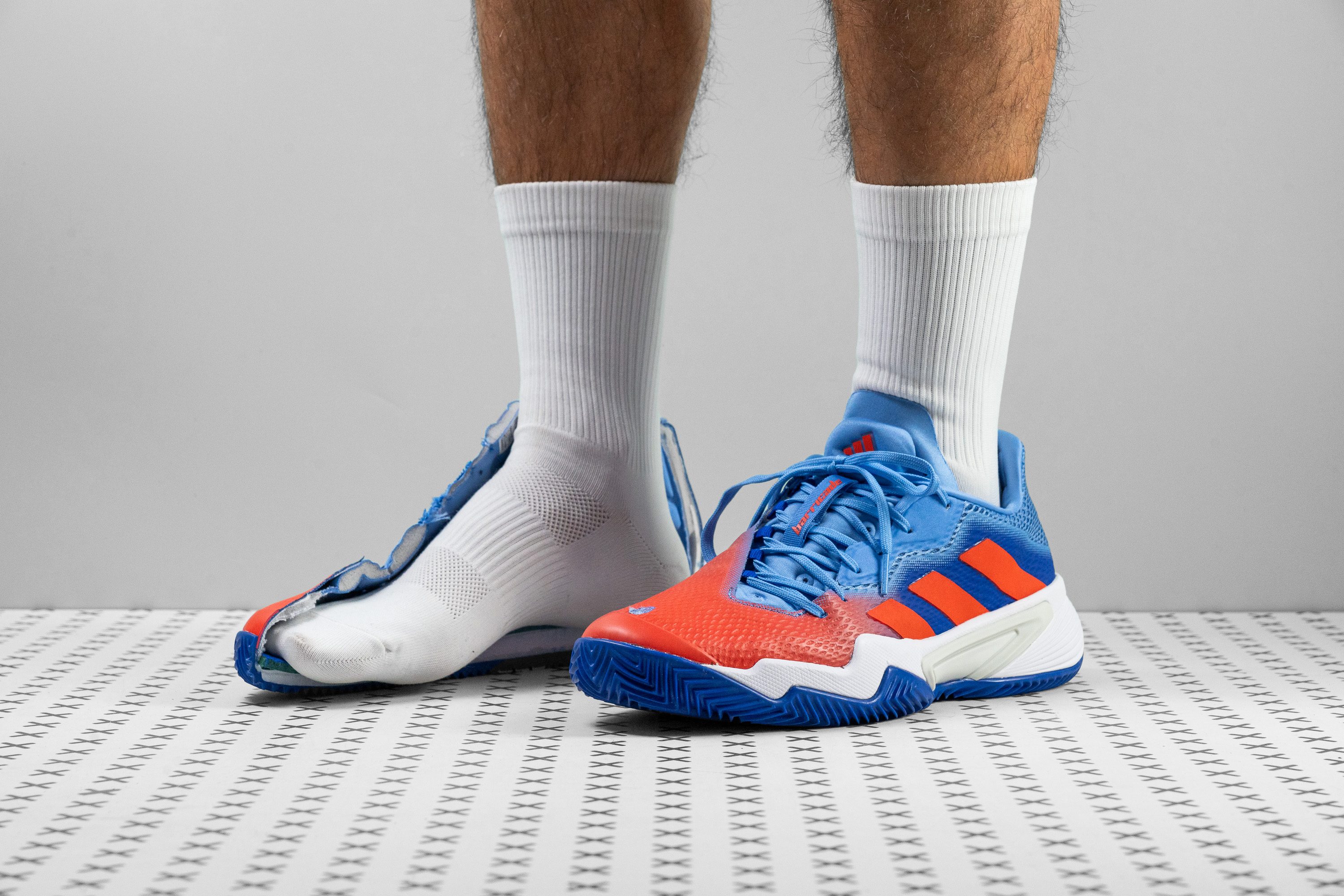Our verdict
- Top pick in best Adidas tennis shoes (2023)
Pros
- Stability level is through the roof
- Wider-than-average platform
- Solid toebox and outsole durability
- Supportive and bouncy cushioning
- Excellent impact protection
- Perfect grip-and-give combination
- Very comfortable interiors
Cons
- Among the heavier shoes
- Not for narrow feet
- No outsole durability guarantee
Audience verdict
Comparison
The most similar tennis shoes compared
+ + Add a shoe | |||||
|---|---|---|---|---|---|
| Audience score | 78 Good! | 88 Great! | 84 Great! | 84 Great! | |
| Price | $150 | $160 | $170 | $160 | |
| Shoe type | Clay Court | All CourtHard Court | Hard Court | Clay Court | |
| Shock absorption | - | Moderate | Moderate | - | |
| Energy return | - | Low | Low | - | |
| Traction | - | High | - | - | |
| Construction | Stability | Stability | Stability | Stability | |
| Breathability | Moderate | Moderate | Moderate | Moderate | |
| Weight lab | 14.5 oz / 410g | 13.9 oz / 394g | 14.3 oz / 406g | 13.3 oz / 378g | |
| Drop lab | 12.1 mm | 11.3 mm | 10.4 mm | 12.4 mm | |
| Width / fit | Medium | Medium | Medium | Wide | |
| Toebox width | Medium | Medium | Narrow | Medium | |
| Size | Slightly small | Slightly small | True to size | True to size | |
| Midsole softness | Balanced | Balanced | Firm | Balanced | |
| Stiffness | Stiff | Moderate | Stiff | Stiff | |
| Torsional rigidity | Stiff | Stiff | Stiff | Stiff | |
| Heel counter stiffness | Moderate | Stiff | Moderate | Moderate | |
| Midsole width - forefoot | Wide | Wide | Wide | Average | |
| Midsole width - heel | Wide | Wide | Average | Very wide | |
| Outsole durability | Bad | Decent | Good | Bad | |
| Heel padding durability | Decent | Decent | Bad | Good | |
| Collaboration | - | - | Novak Djokovic | - | |
| Heel stack lab | 29.1 mm | 28.4 mm | 32.2 mm | 30.2 mm | |
| Forefoot | 17.0 mm | 17.1 mm | 21.8 mm | 17.8 mm | |
| Insole thickness | Thick | Thick | Average | Thick | |
| Removable insole | ✓ | ✓ | ✓ | ✓ | |
| Heel tab | None | Extended heel collar | None | Finger loop | |
| Toebox durability | Good | Decent | Good | Good | |
| Outsole hardness | Soft | Average | Average | Soft | |
| Outsole thickness | Average | Very thin | Thin | Average | |
| Ranking | #45 Bottom 15% | #10 Top 24% | #22 Bottom 47% | #21 Top 50% | |
| Popularity | #50 Bottom 5% | #9 Top 22% | #2 Top 5% | #38 Bottom 9% |
Who should buy
As one of Adidas' top-rated and best-selling tennis shoes, we believe that the Barricade Clay remains a perfect option for players who:
- want uncompromised arch support and stability
- expect responsive cushioning for a dynamic playing style
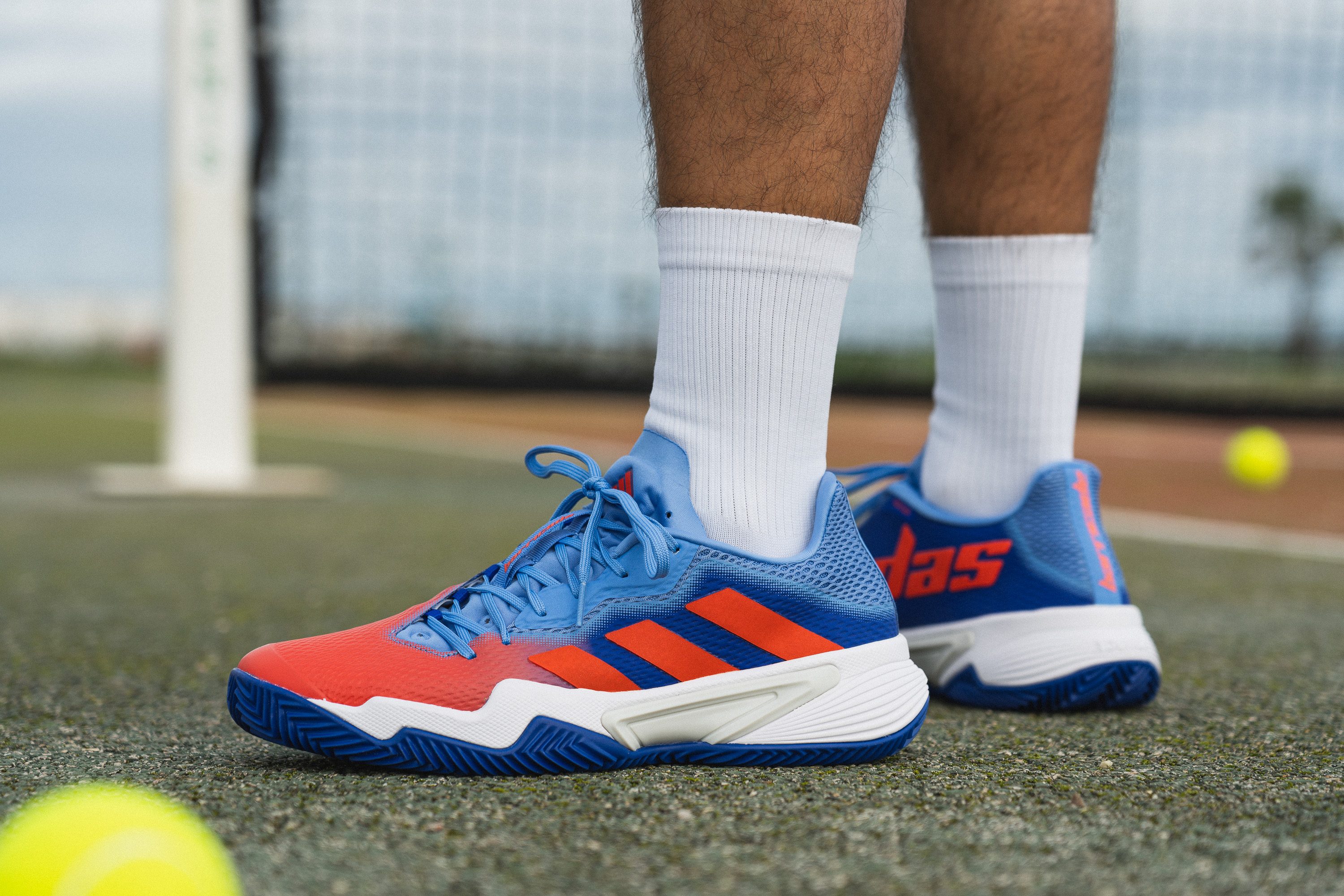
Who should NOT buy
if you've never experienced an asymmetrical lacing system and you're not in the mood for experiments, the ASICS Gel Resolution 9 Clay is a much safer bet.
This version of the Barricade received a massive upgrade from the predecessor but it feels a bit like a work in progress. We think that the newer Adidas Barricade 13 Clay addressed some of its shortcomings and it comes with a 6-month outsole guarantee.
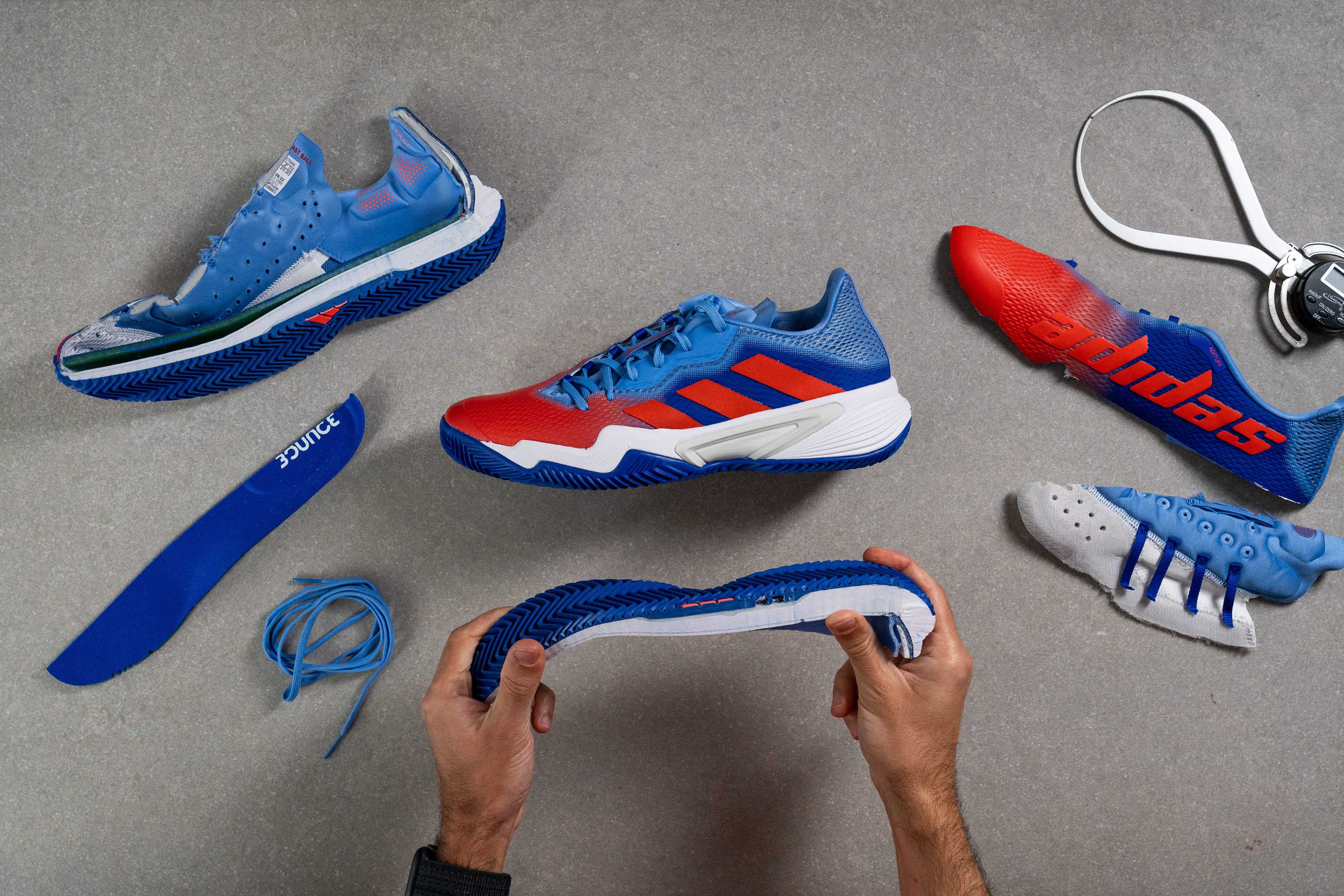
Cushioning
Heel stack
No matter how hard we planted our heels during the playtest, the Adidas Barricade was there for us every time. The impact protection is hard to beat in this shoe!
Measuring its heel stack with a caliper, we got 29.1 mm which is in the average range of tennis shoes.
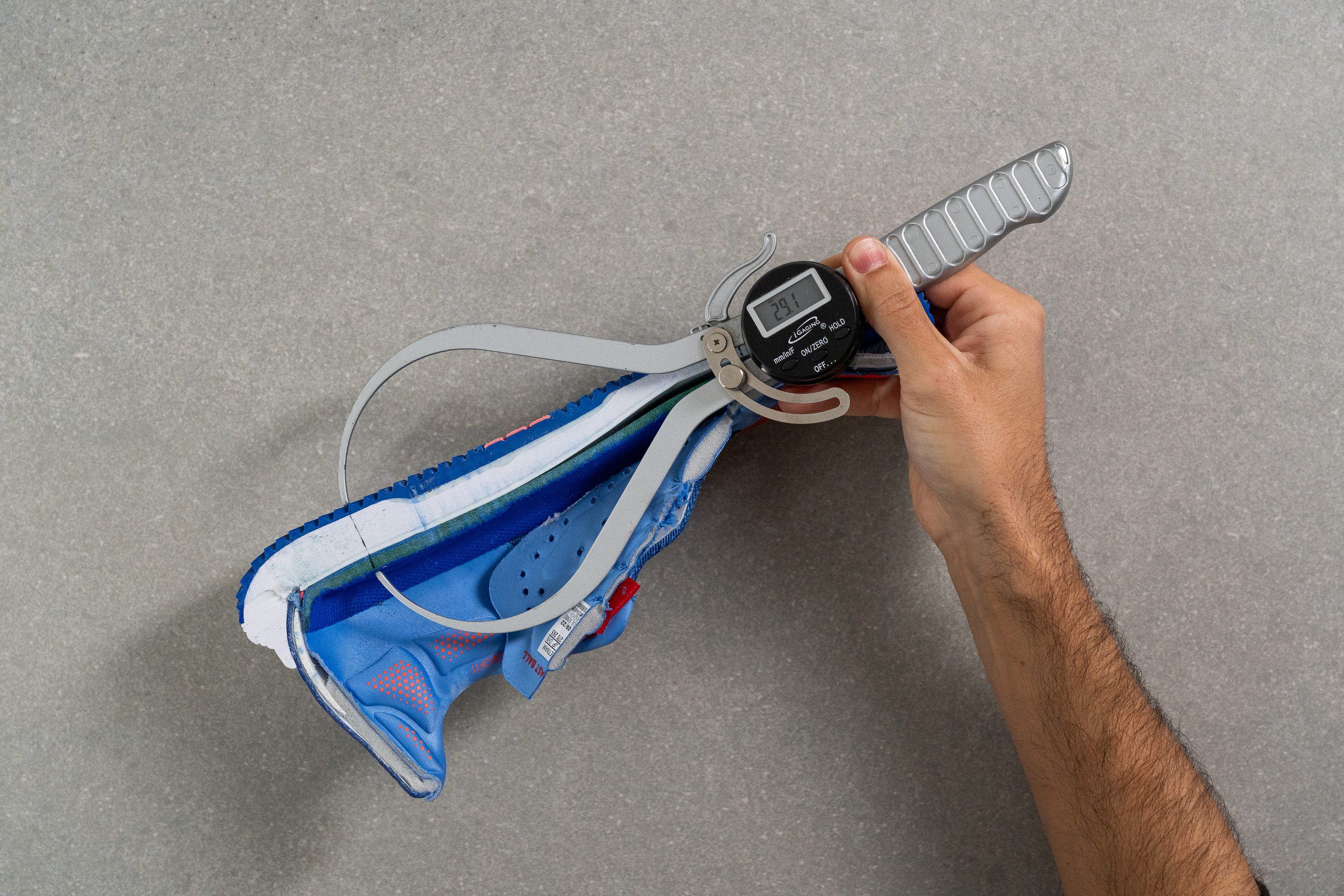
| Barricade Clay | 29.1 mm |
| Average | 29.2 mm |
Forefoot stack
The forefoot, on the other hand, is very noticeably low to the ground at only 17.0 mm. A few millimeters thinner than average, it made our big toes feel the ground very intimately.
Some players may prefer more cushioning in this area to keep them well-cushioned on their toes. But as for us, we enjoyed the sensitivity and maneuverability it offered in the Barricade.
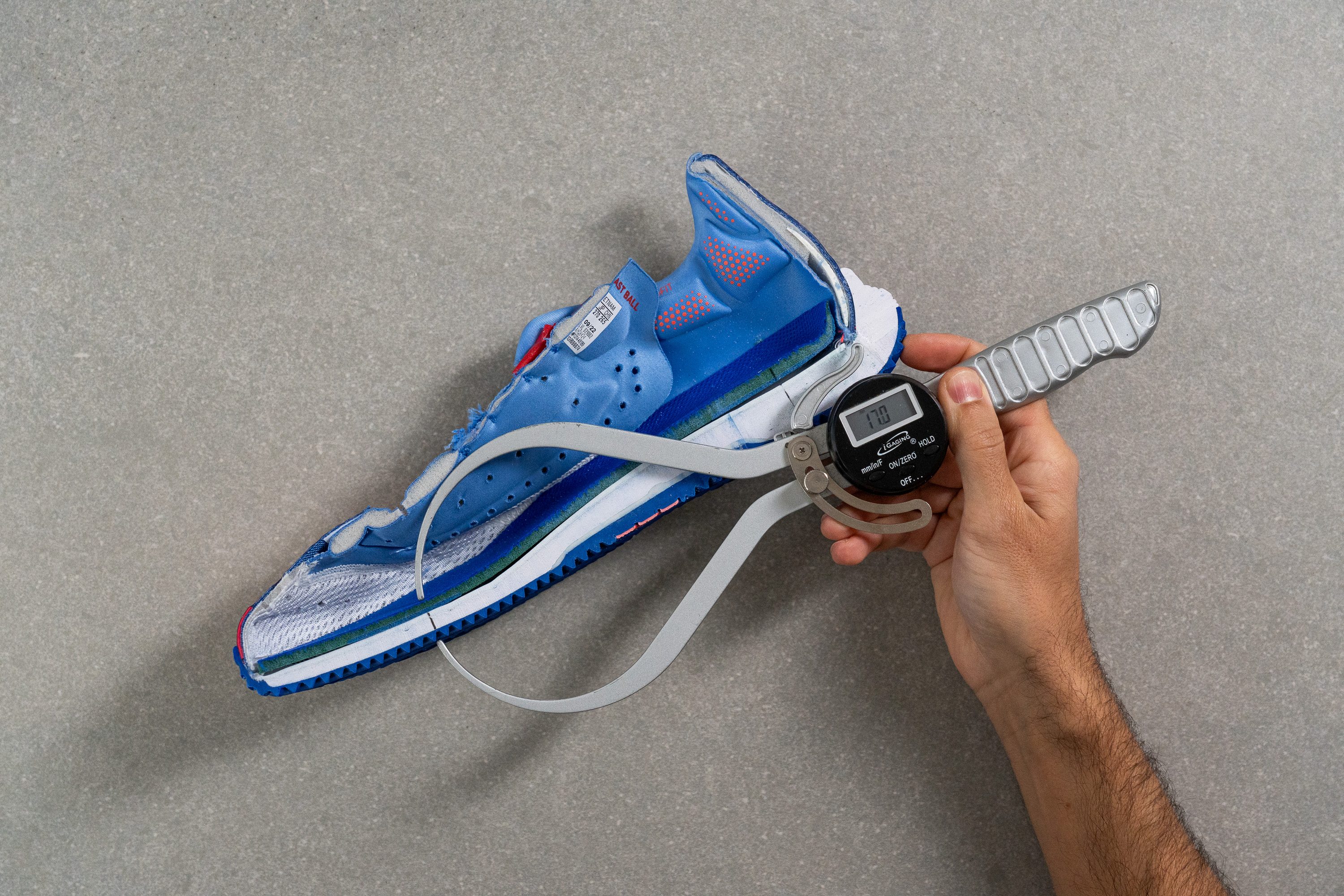
| Barricade Clay | 17.0 mm |
| Average | 19.3 mm |
Drop
The only problem is the shoe's steep incline from the heel to the forefoot. Based on our stack height measurements, it is as high as 12.1 mm (a little over the average).
Doing aggressive forward movements on such a slope resulted in occasional toe-jamming for us. We had to really cinch down the laces and make sure that our feet were securely locked inside the shoe. However, we don't see that happening for players with narrower feet.
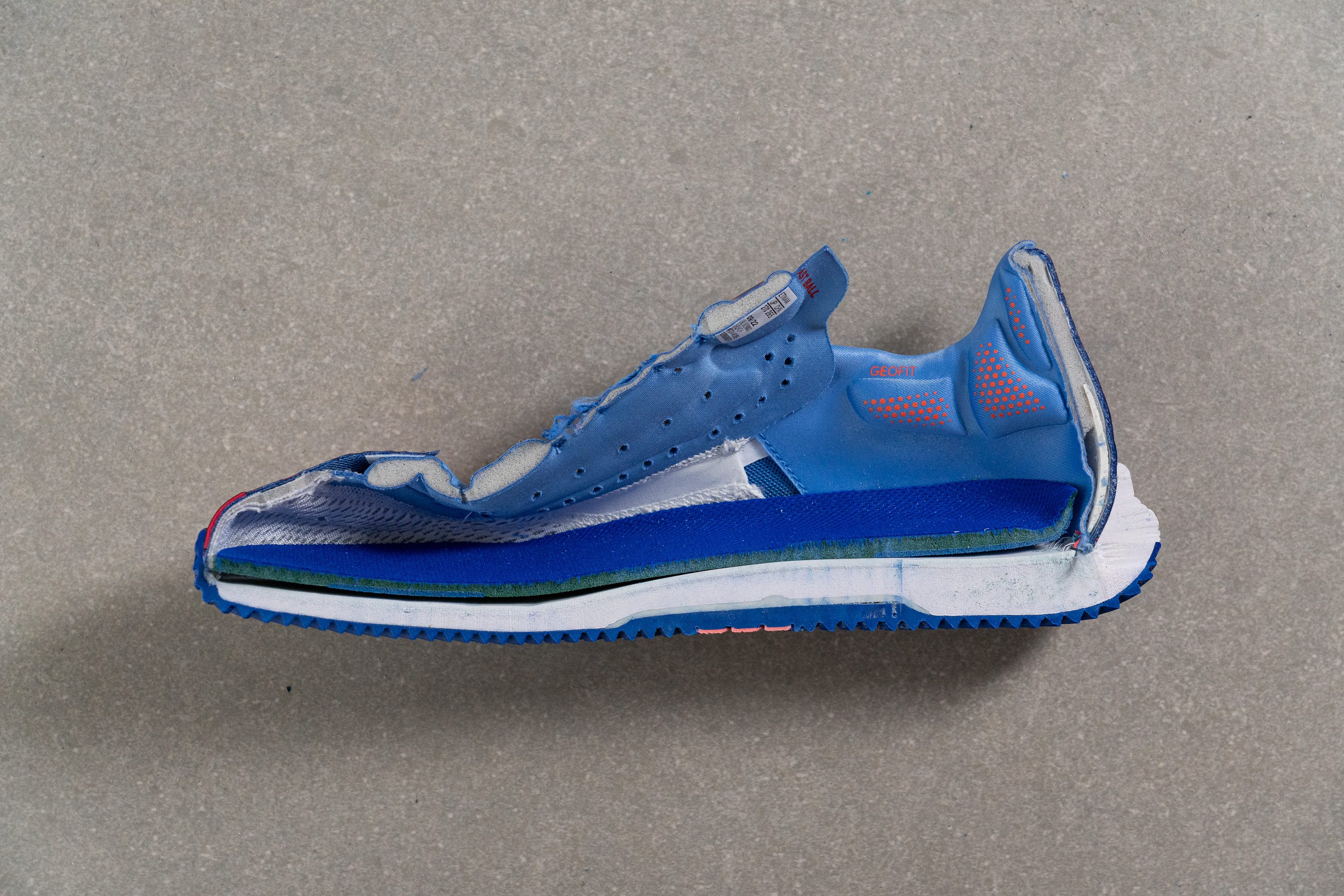
| Barricade Clay | 12.1 mm |
| Average | 9.9 mm |
Midsole softness
If you enjoy a nice little spring in your tennis shoes, we think you're going to enjoy the Bounce cushioning packed into this Barricade.
Pressing our durometer against the foam returned 29.5 HA which is an average reading across tennis shoes. Neither too hard nor mushy, it helped us quickly recover in between shots feeling sprightly and agile.
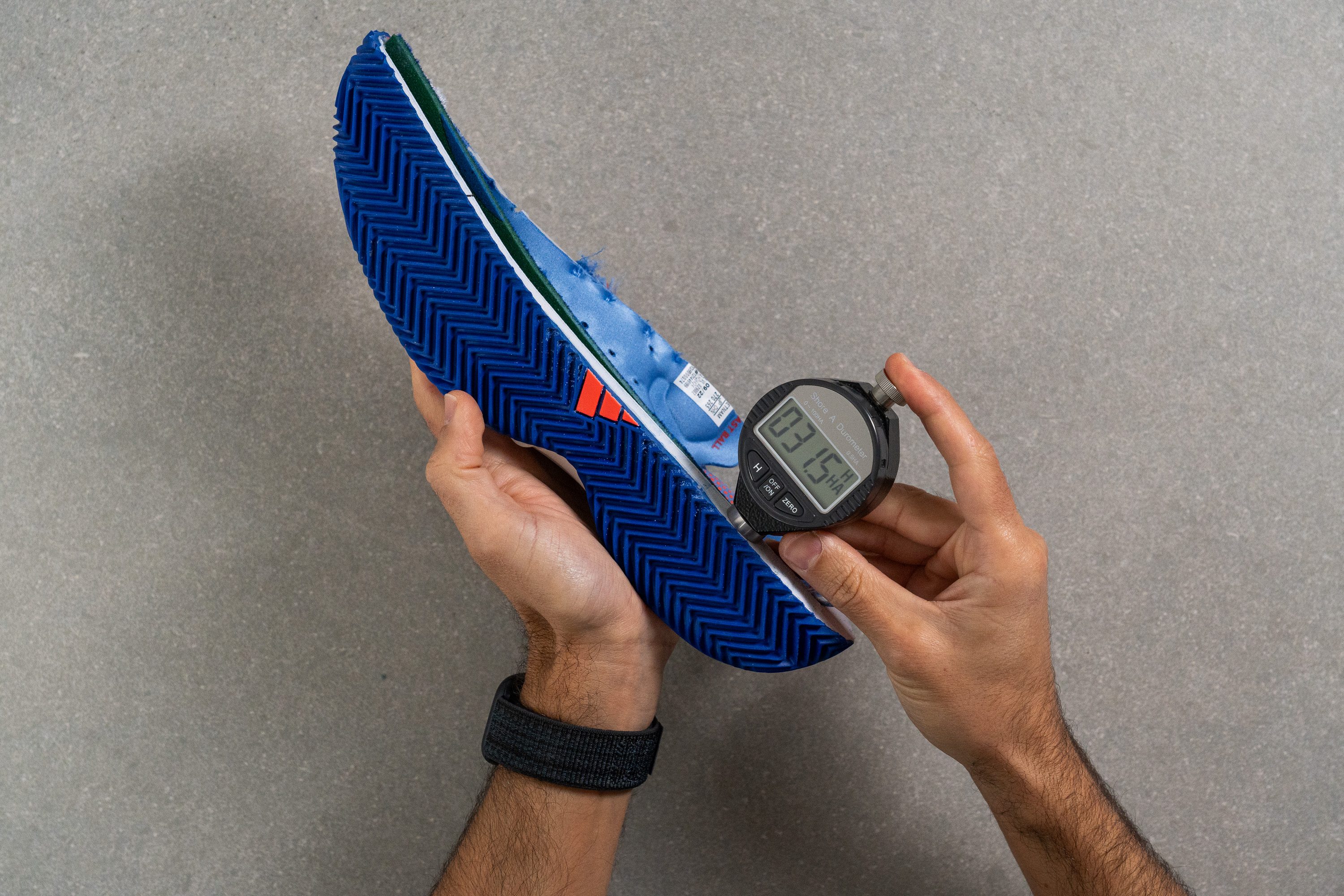
| Barricade Clay | 29.5 HA |
| Average | 28.1 HA |
Size and fit
Size
Adidas Barricade Clay fits slightly small (13 votes).
Internal length
| Barricade Clay | 270.3 mm |
| Average | 271.2 mm |
Width / Fit
The overall fit of the Adidas Barricade Clay felt right at home on our medium-sized feet. But it did feel slightly on the edge of loose, triggering us to really cinch down the laces before heading for the court.
Checking the gel mold of the shoe's interiors in the widest part, our caliper measurement confirmed an above-average reading of 94.5 mm. Slightly wider than the average.
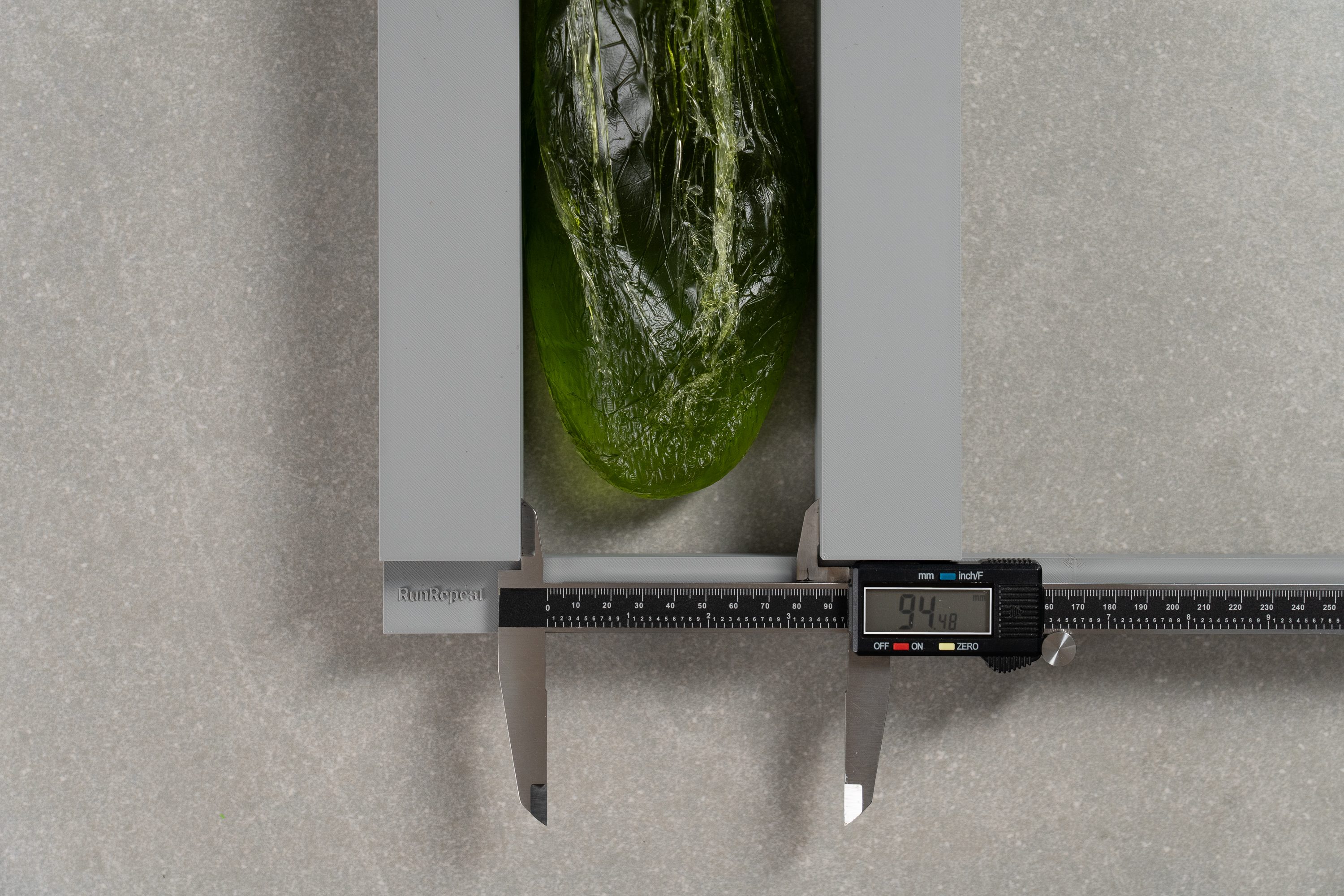
We don't think that this is the best option for players with narrow feet given the risk of toe jamming. The shoe's unique lacing system doesn't allow to tighten up the fit that much.
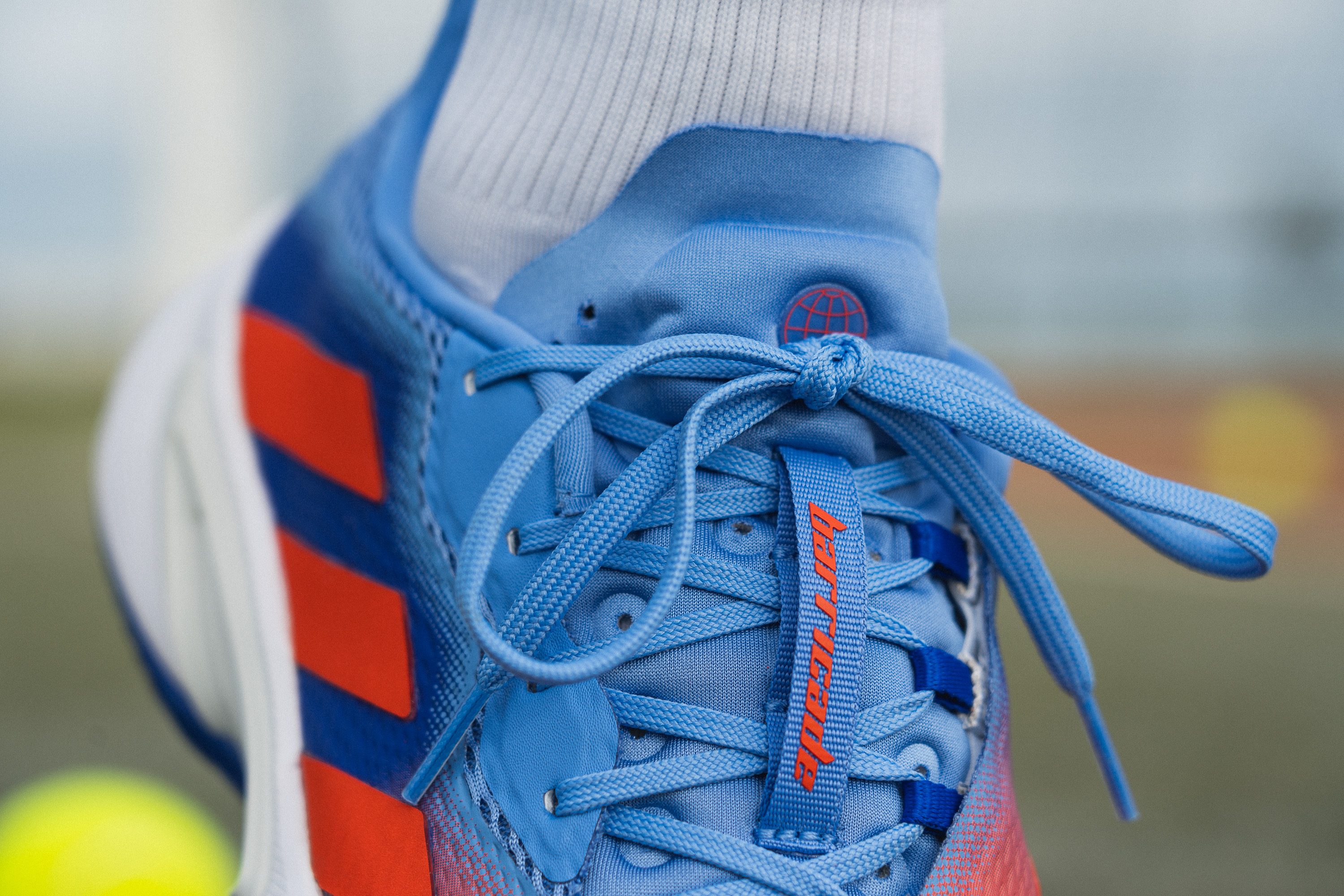
| Barricade Clay | 94.5 mm |
| Average | 92.9 mm |
Toebox width
On the bright side, the Barricade Clay offers a regular amount of toe room towards the tip of the forefoot. Measuring its width at the big toe mark, our caliper showed a standard reading of 68.3 mm.
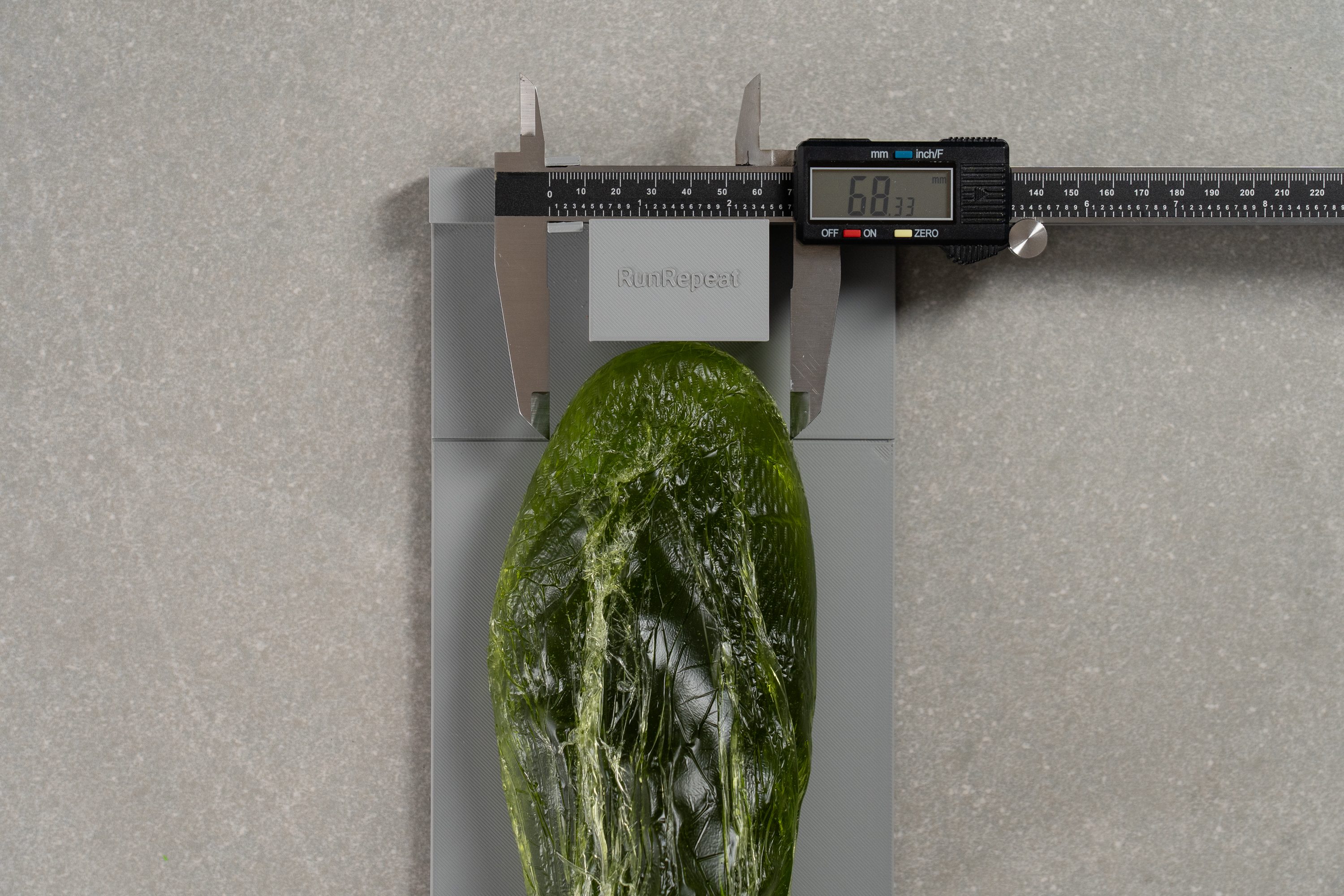
| Barricade Clay | 68.3 mm |
| Average | 69.3 mm |
Toebox height
The shoe's vertical space is on par with the average too showing a toebox height of 24.4 mm.
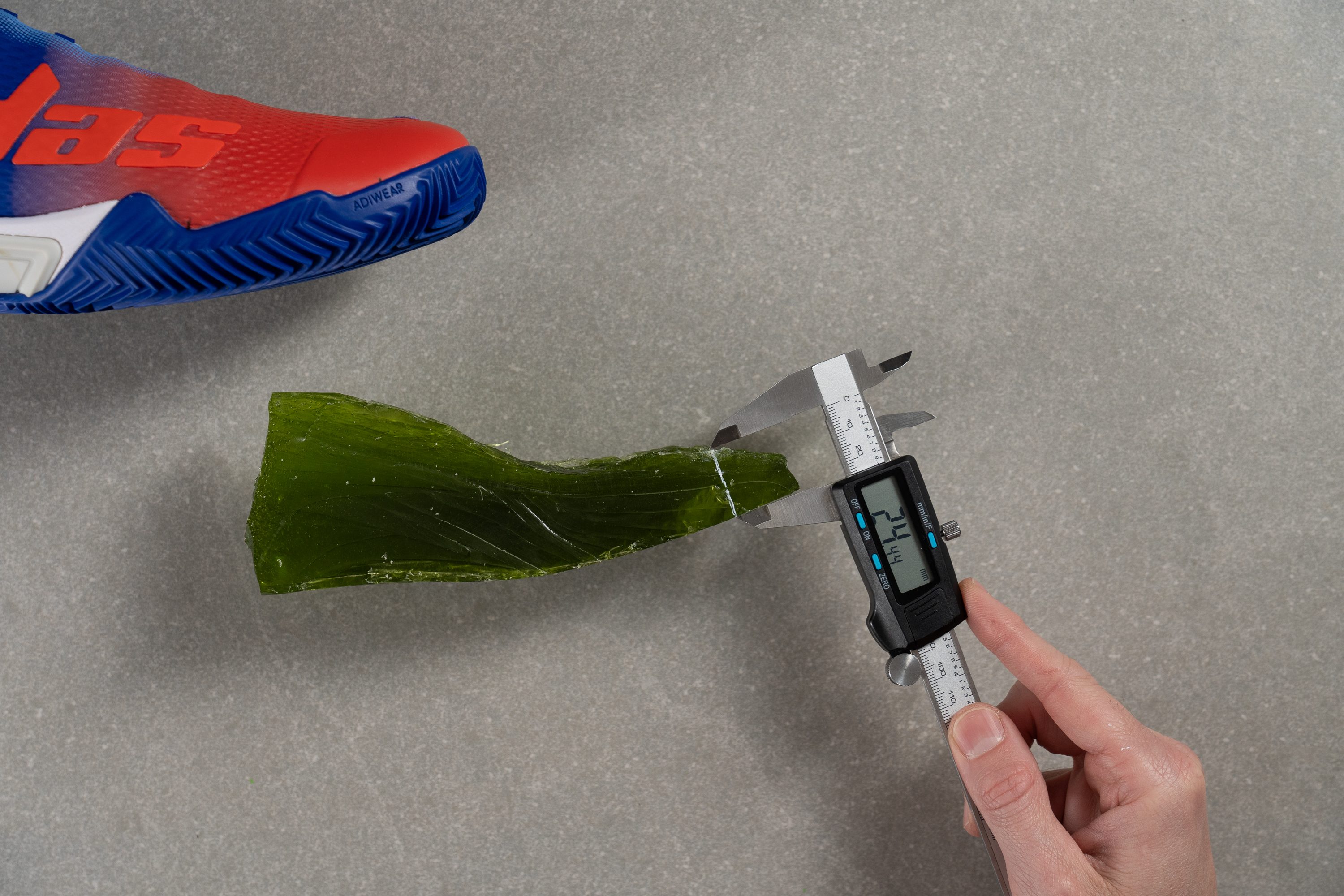
| Barricade Clay | 24.4 mm |
| Average | 25.0 mm |
Flexibility / Stiffness
Even though the Adidas Barricade Clay is so rigid torsionally, its forefoot has enough pliability to bend along with the foot.
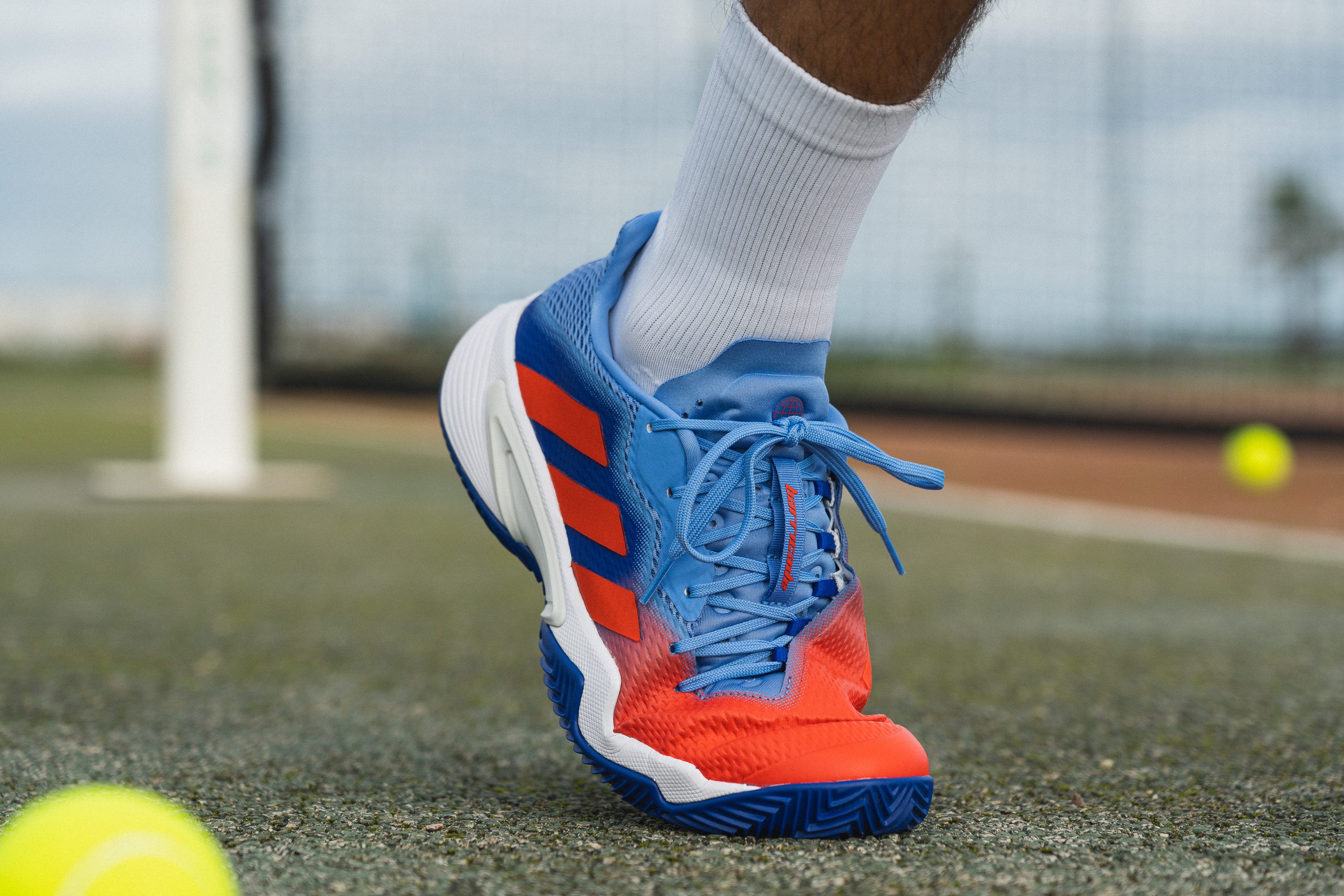
In our controlled flexibility test, we bent the shoe to a 90-degree angle with the help of a force gauge. The tool showed that it takes 23.7N to do that. That is 25% less than it takes a tennis shoe on average.
The only caveat is that the PU coating creases pretty badly. It didn't rub against our toes but was quite tangible and distracting at times.
This test follows an older methodology, which is why you don't see recently tested shoes in the chart. Results from different methodologies can not be compared.
| Barricade Clay | 23.7N |
| Average | 30.7N |
Weight
Even though this renewed version of the Barricade loses a little bit of bulk, it is still a whale on the scale we've come to expect.
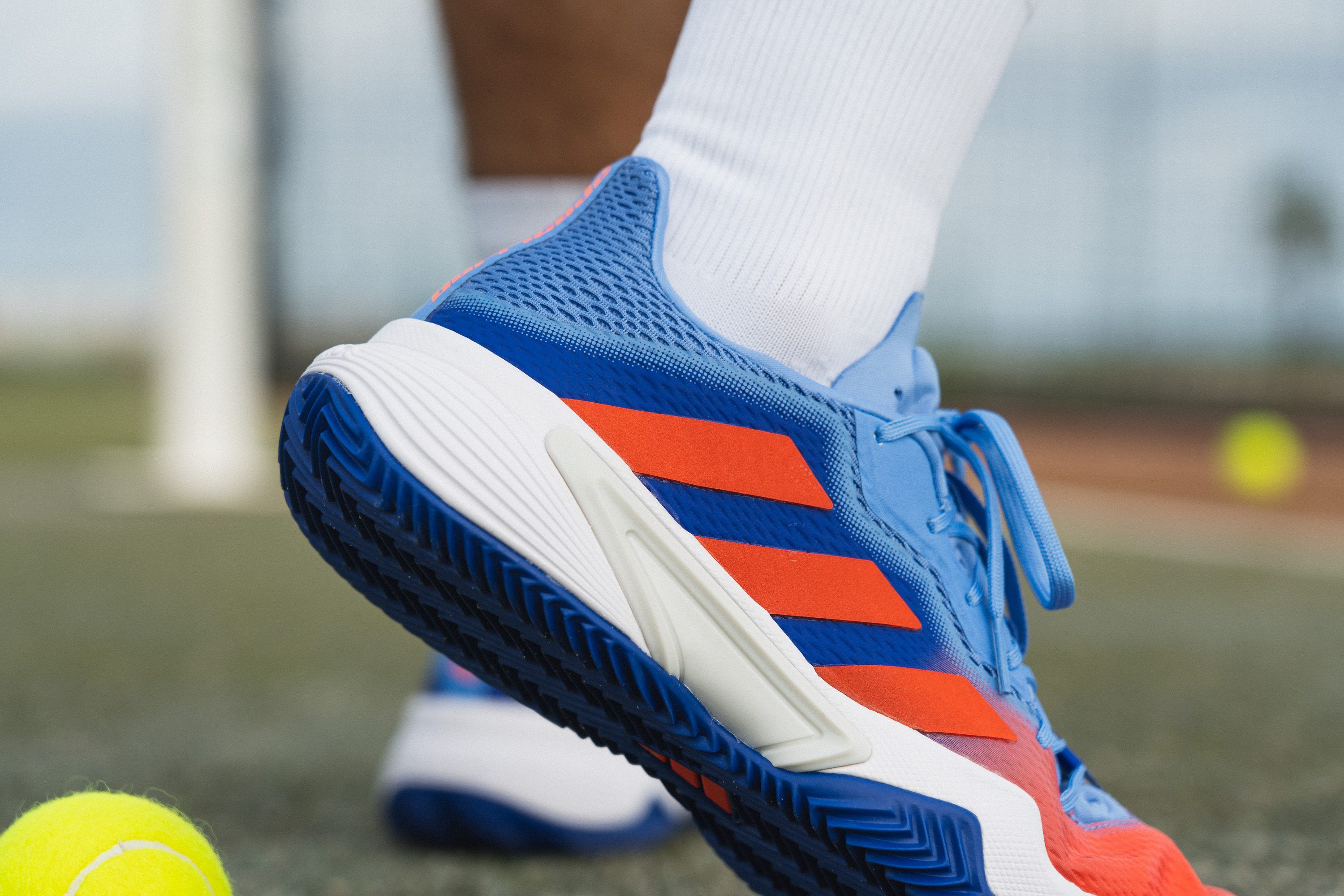
In a men's US size 9, this Adidas shoe returned a whopping 14.5 oz (410g). By far, it is the heaviest tennis shoe on our roster. If a lighter shoe is a must, get the 2023 Barricade 13 Clay (13.4 oz/378g) or try an even lighter speed-oriented Adidas Ubersonic 4.1 (12.3 oz/349g).
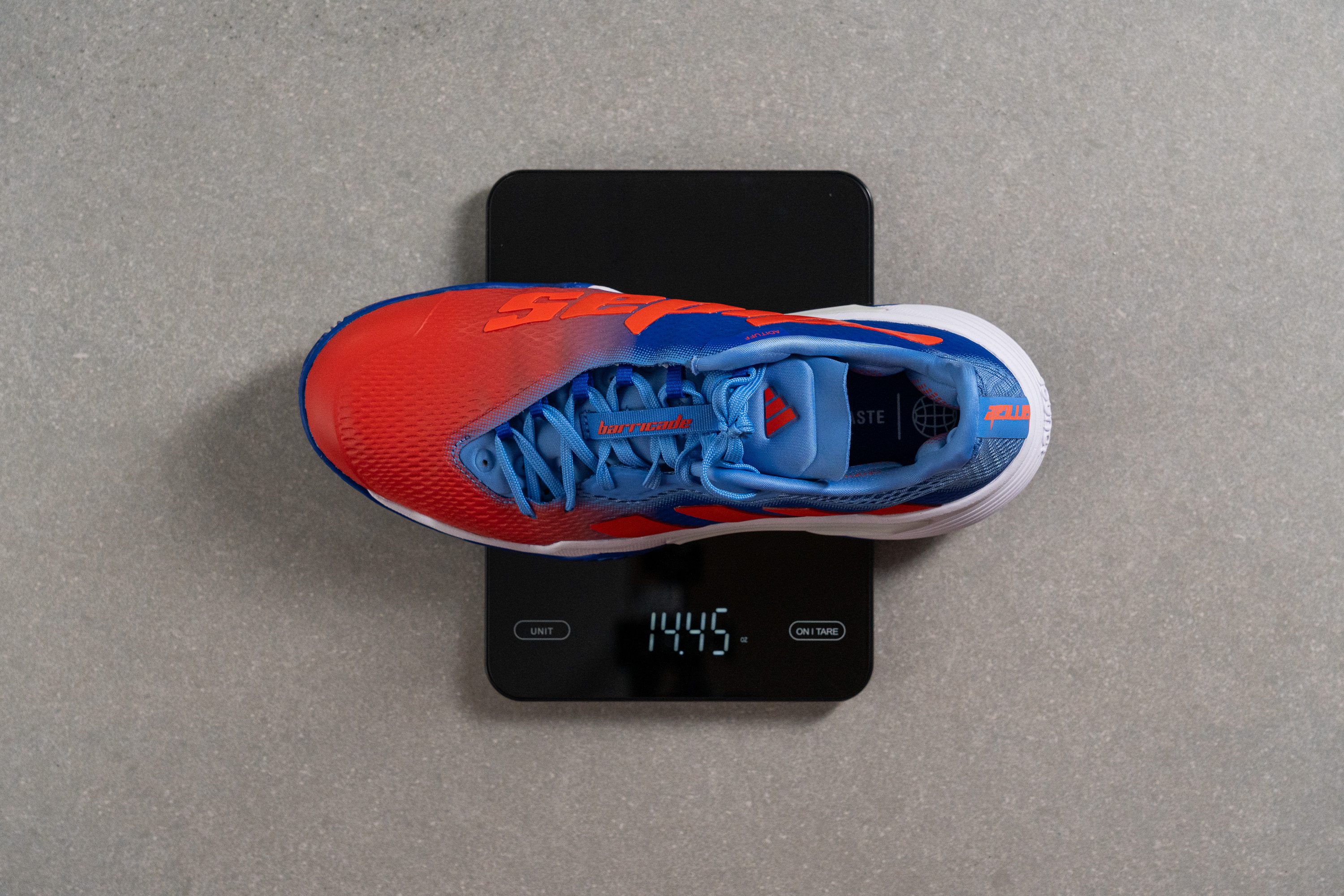
| Barricade Clay | 14.5 oz (410g) |
| Average | 12.8 oz (364g) |
Breathability
If you are concerned about getting your feet toasty, the Barricade Clay will most likely leave you disappointed.
As you can see from our smoke-pumping machine test below, the Barricade only lets out a thin streak of vapor. But because it's not entirely stuffy, we gave the shoe's breathability a moderate score of 3 out of 5.
With its upper fully covered in PU, ventilation is only allowed through a dozen ventilation holes in the tongue. You can see them clearly in our transparency test below as we hover the half-cut upper over the light.
We even attempted to find more pores in the shoe's toebox through a microscope.
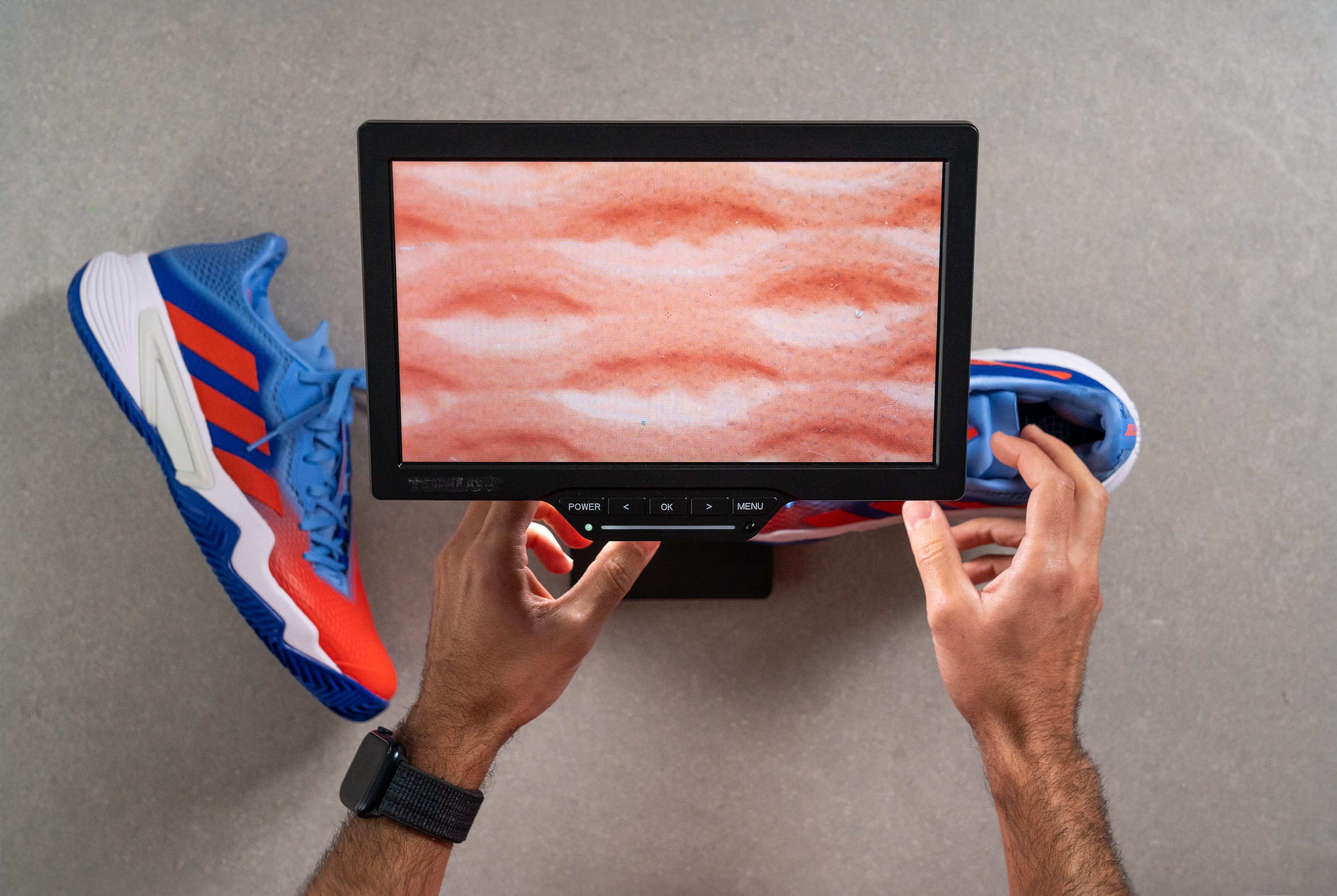
But as you can see from the photos, the PU coverage is very dense in this Adidas shoe.
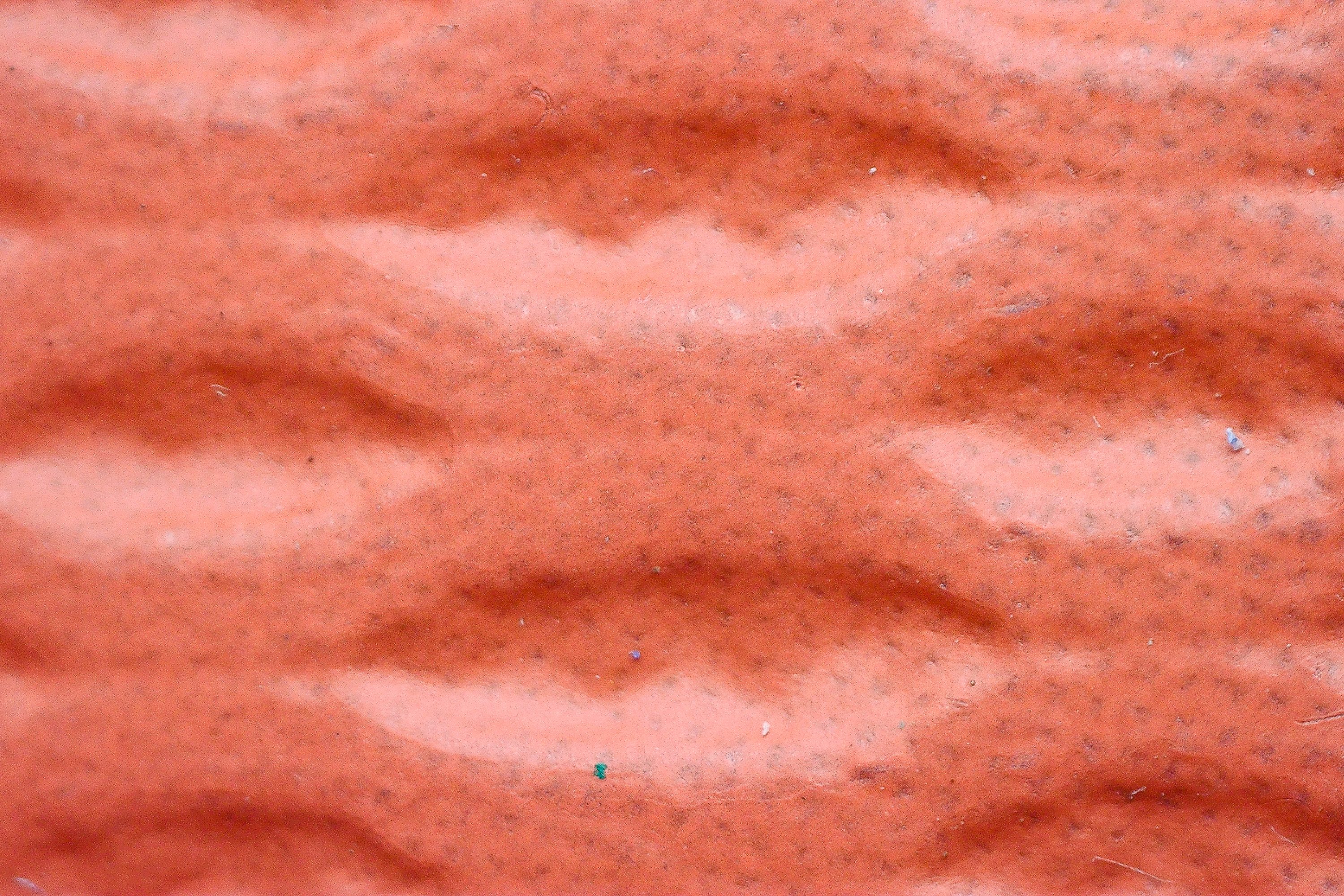
| Barricade Clay | 3 |
| Average | 3.1 |
Stability
Lateral stability test
In the tennis shoe realm, "Barricade" has long been synonymous with stability. And this reiteration of the iconic Adidas shoe continues that legacy successfully. Our feet felt planted at all times, no matter how fast and awkward the footwork got.
Torsional rigidity
The star of the shoe is of course Adidas' proprietary Torsion System. This stiff TPU shank wraps around the midfoot hugging it with large and unforgiving wings on the sides.
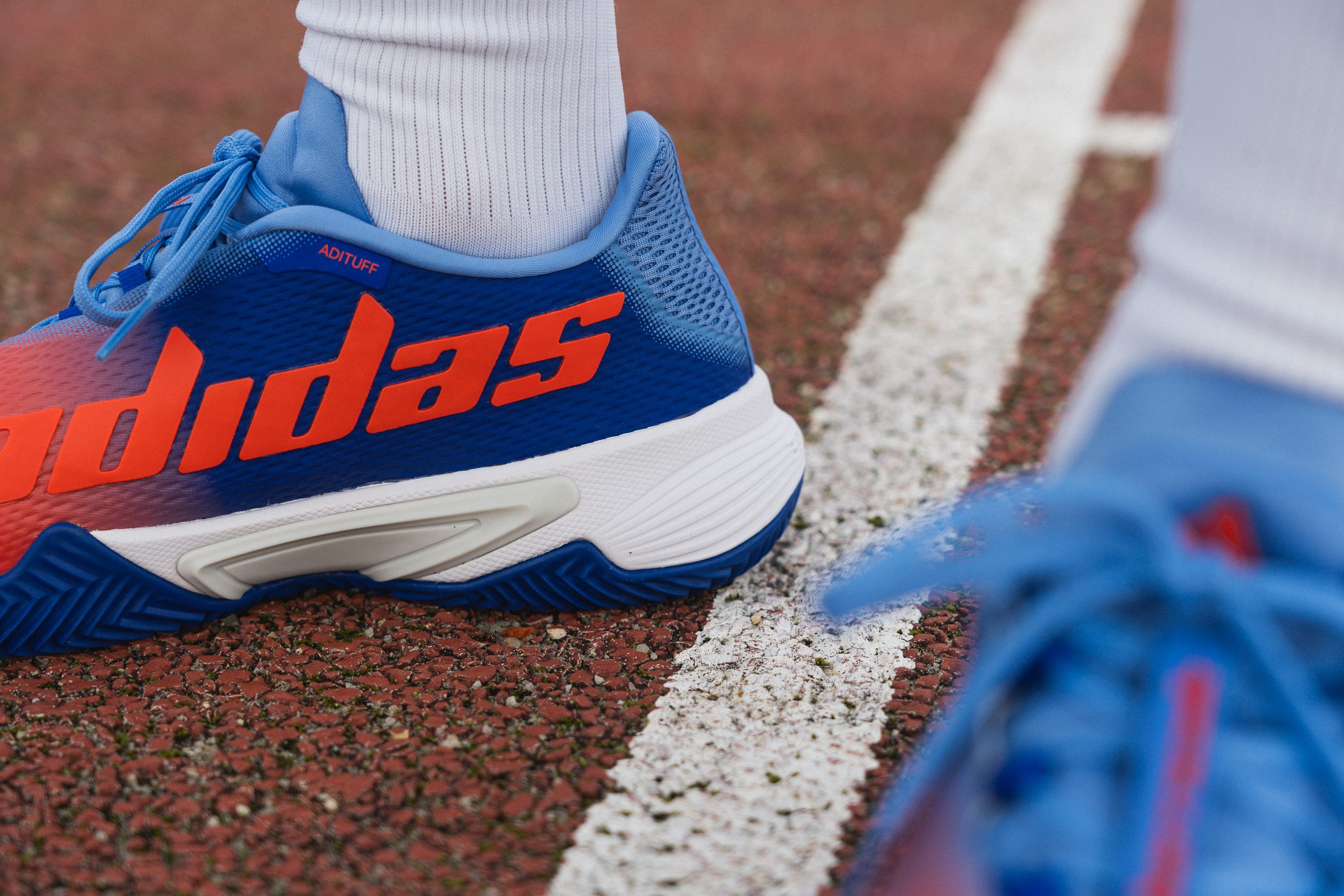
The result is a highly rigid platform that supported our arches brilliantly and made us forget what an ankle roll is. Is that a kind of sushi?
Attempting to twist the Adidas Barricade Clay in our manual test was of no effect, earning the shoe th highest stiffness score of 5/5.
| Barricade Clay | 5 |
| Average | 4.5 |
Heel counter stiffness
The shoe also comes with a rather supportive and structured heel counter. Assessing its rigidity in our lab, we gave it nearly the highest score - 4 out of 5.
In addition to being stiff, the Barricade also creates a secure heel hold with the GeoFit pods. These padded pillows create a rather ergonomic hug around the ankle.
A great alternative to a thick-foamed collar, we love how this setup offers the same benefit with fewer materials.
| Barricade Clay | 4 |
| Average | 4.1 |
Midsole width - forefoot
With the Adidas Barricade Clay, we were always guaranteed a safe and planted landing. Its forefoot comes with a large outrigger creating extended contact points with the ground.
Measuring the platform in its widest part, our caliper showed 114.8 mm which is slightly wider than the average. This is the kind of base you can trust when doing the most extreme lateral movements.
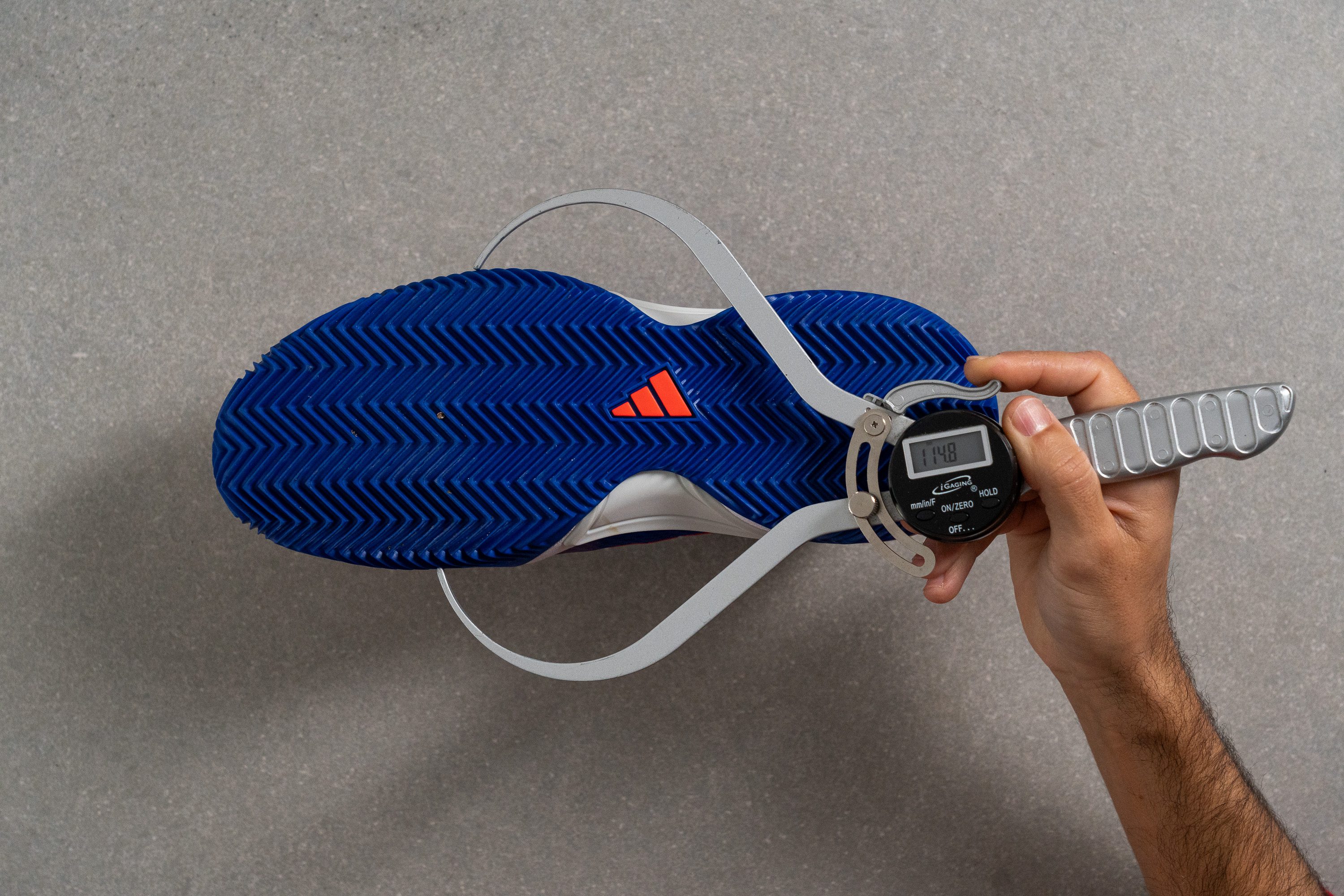
| Barricade Clay | 114.8 mm |
| Average | 112.0 mm |
Midsole width - heel
The shoe also beats records in the heel portion of the sole. We didn't even need a caliper to see that it is larger than most tennis shoes.
But when we actually measured it, we got a whopping 96.3 mm in the widest part. It is among the widest heels we've seen in tennis shoes.
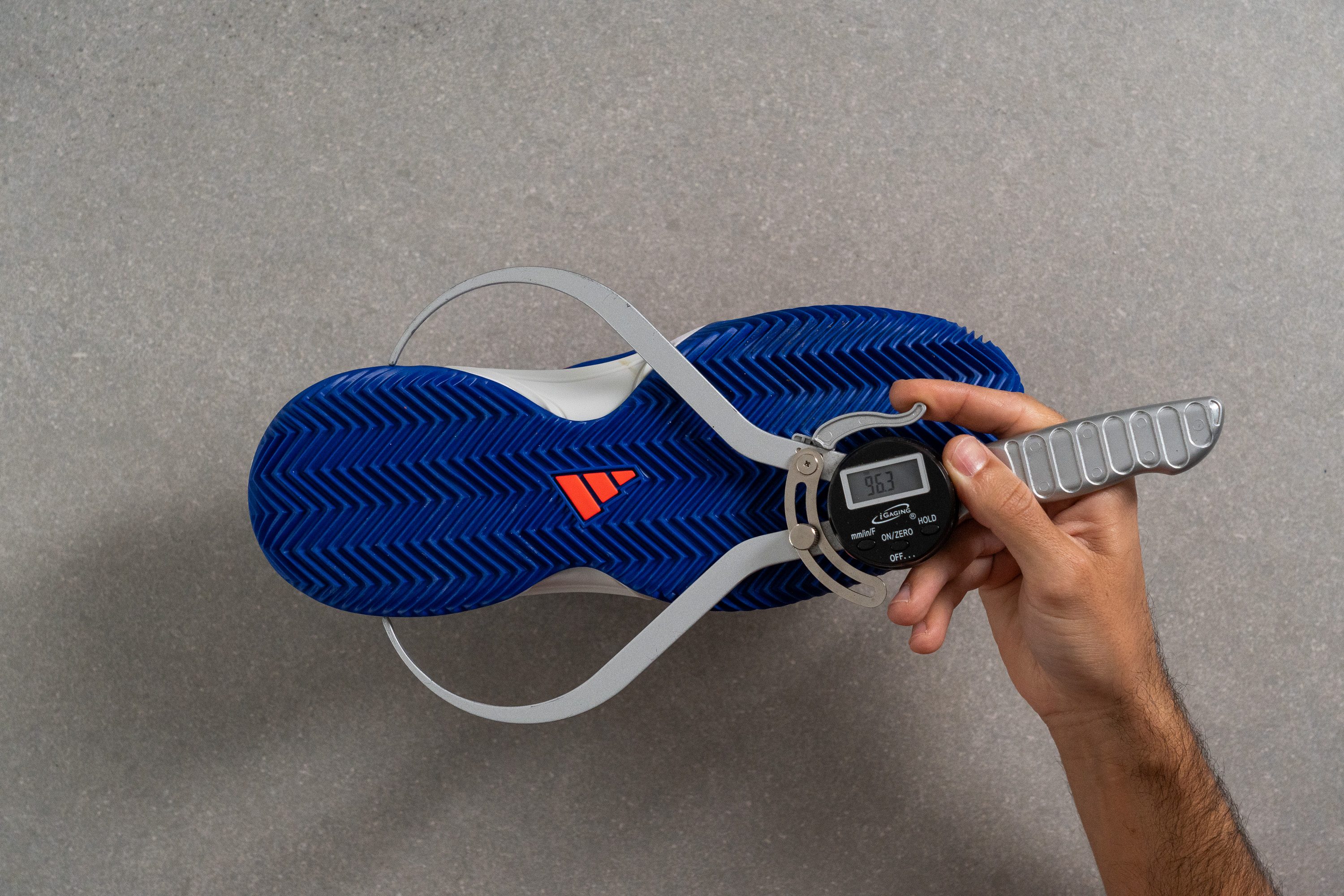
| Barricade Clay | 96.3 mm |
| Average | 89.8 mm |
Durability
Toebox durability
But we can forgive and forget it when tennis shoes sacrifice breathability for enhanced wear resistance. And this Barricade showed some pretty good results in our toebox durability test.
Using a Dremel with a sandpaper tip, we held it against the shoe's upper material for 12 seconds. The speed (5K RPM) and pressure (3.2N) remained consistent.
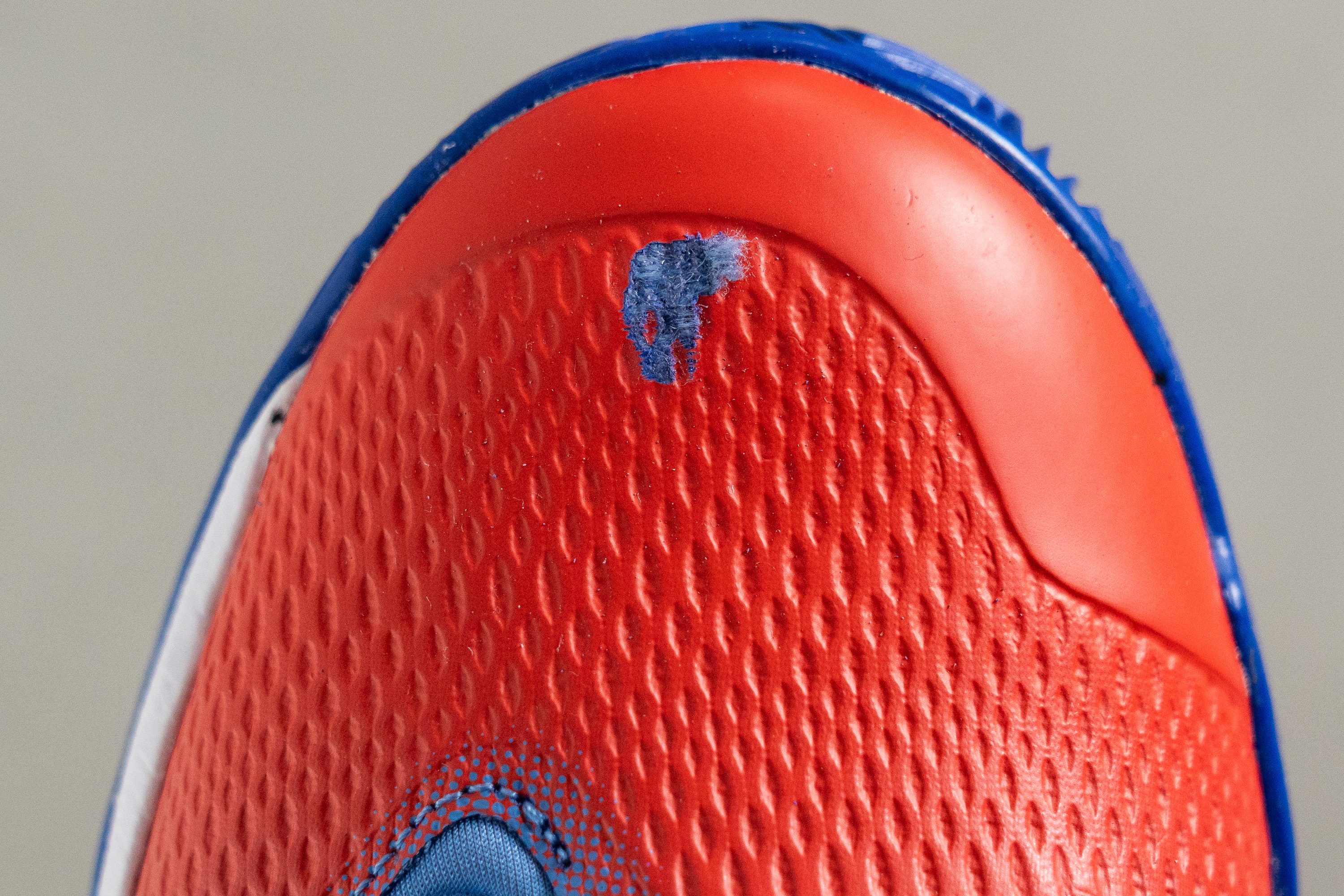
Luckily, the damage turned out to be minor enough and the tip didn't blow through the fabric completely. On a durability scale from 1 to 5, we gave it nearly the highest score of 4.
Interestingly enough, Adidas managed to achieve the same level of durability without covering the upper with PU in its updated 2023 edition.
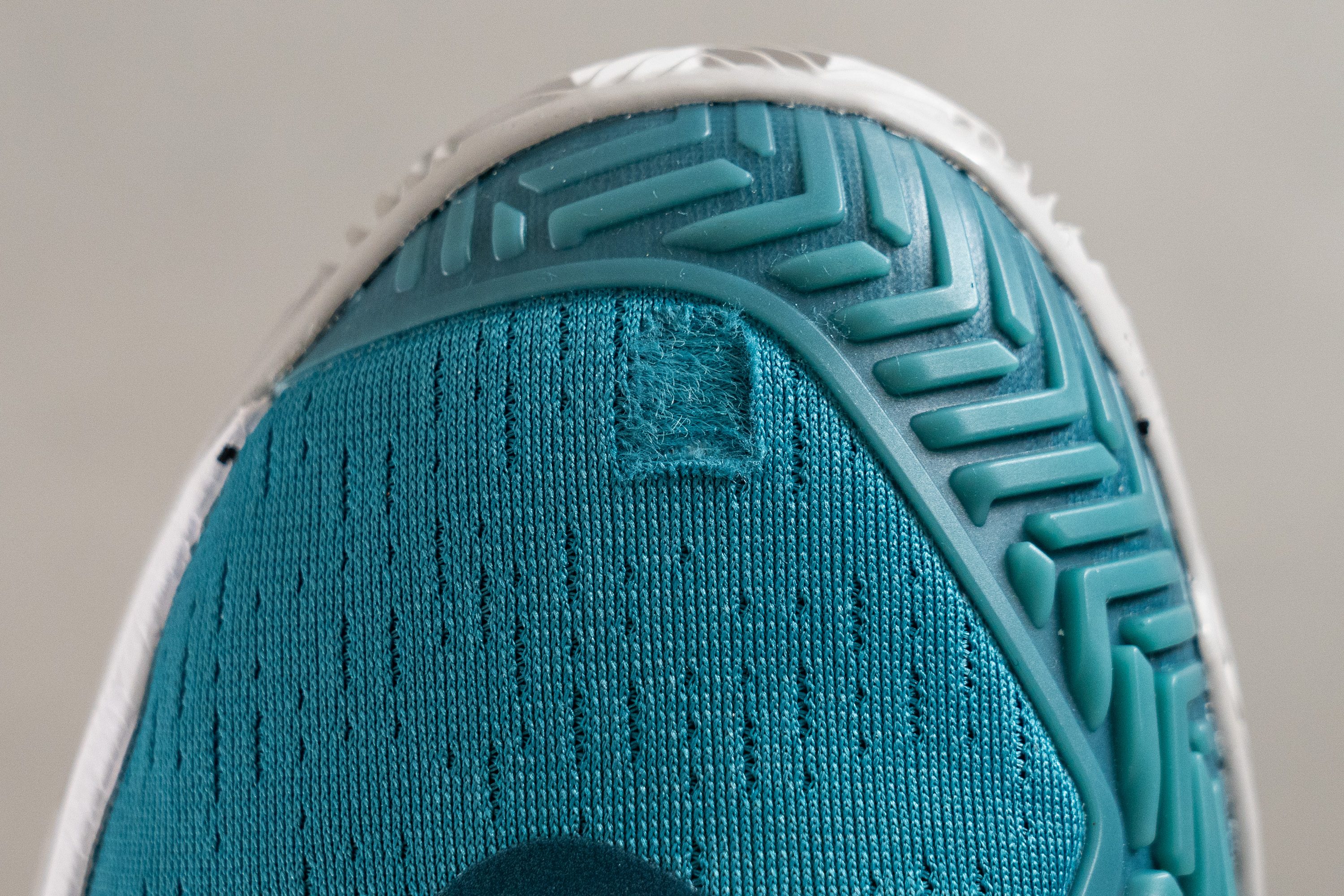
Checking the Adituff overlay on the medial side of the shoe's toebox, we also think that the 2023 version is much better equipped for aggressive toe dragging.
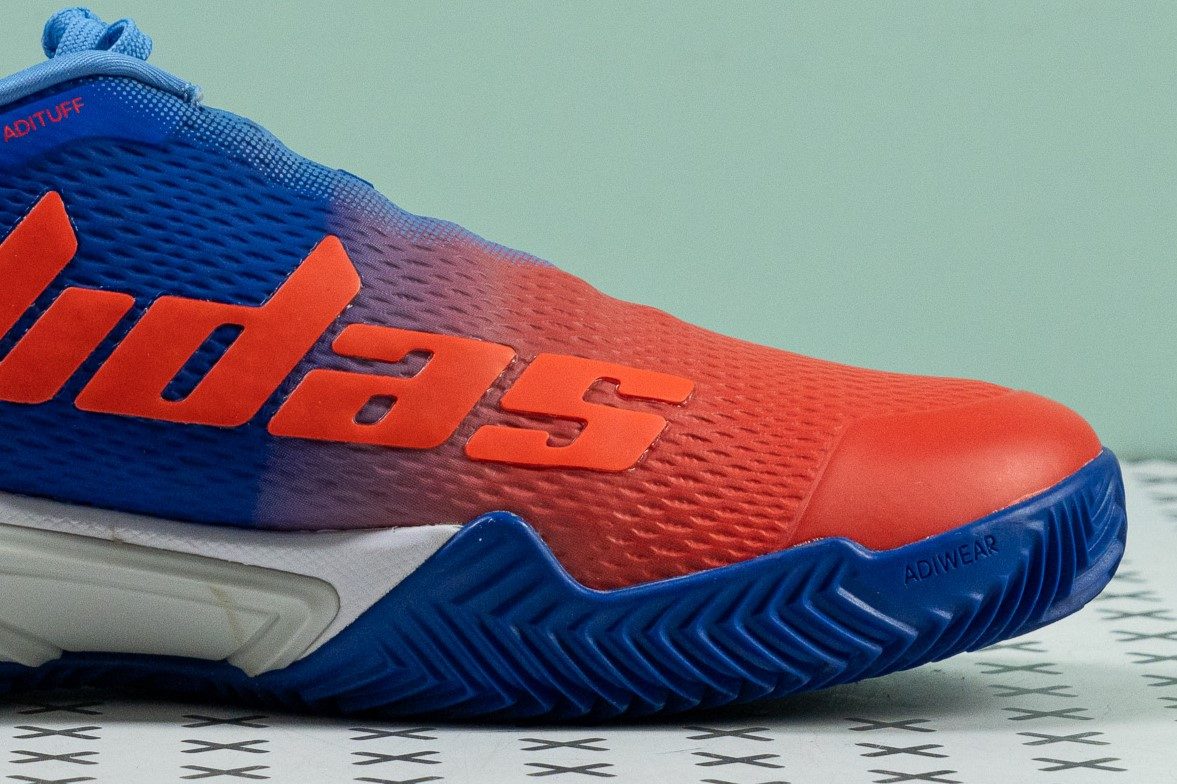
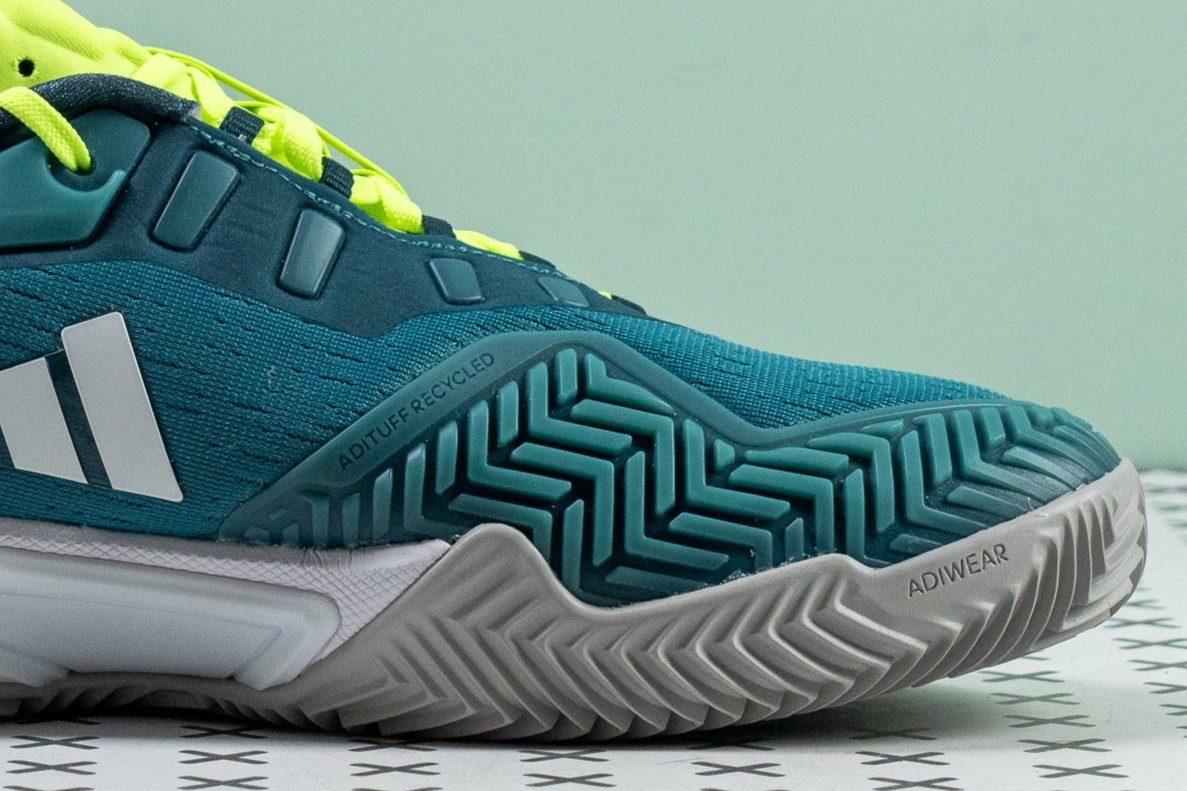
| Barricade Clay | 4 |
| Average | 3.7 |
Heel padding durability
The inner lining is a very touchy subject for most tennis shoes. As one of the more delicate shoe parts, it is quite often prone to tearing fast. Once again, we used a Dremel to test that on the Barricade Clay.
After 4 seconds of drilling at a 5K RPM speed, the shoe's collar padding developed a visible tear exposing the inner foam. It's not a bad result though and is quite common for tennis shoes. On our heel padding durability scale, we gave it a moderate 3 out of 5.
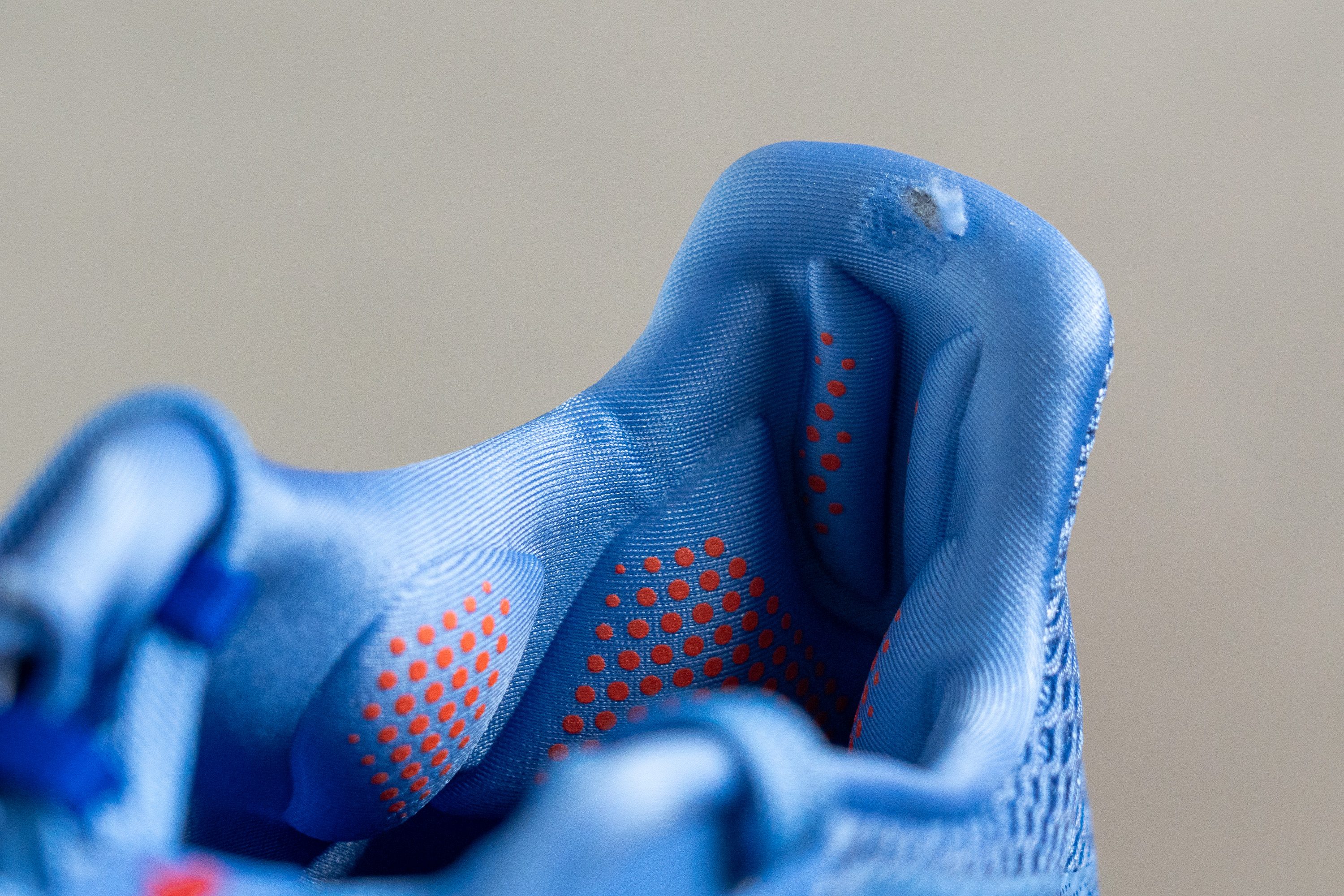
| Barricade Clay | 3 |
| Average | 3.3 |
Outsole hardness
As a clay-court shoe, we expected the Barricade Clay to have a slightly softer outsole rubber compared to hard-court shoes. But not too soft to make it abrasion-sensitive.
With a durometer measurement of 80.0 HC, its hardness turned out to be just right for a clay shoe.
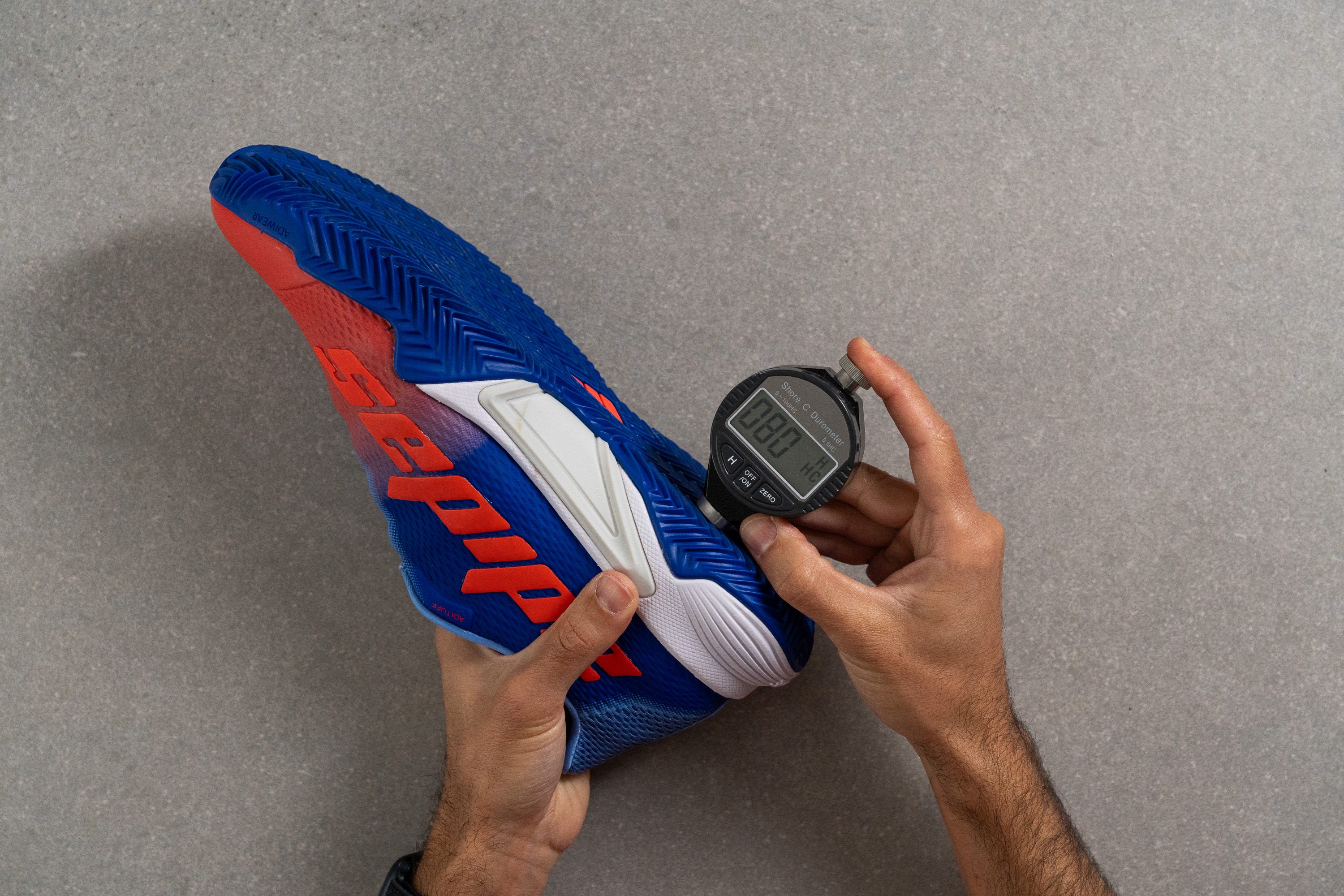
| Barricade Clay | 80.0 HC |
| Average | 86.0 HC |
Outsole durability
As a quick substitute for spending hours on the court, we set the Dremel speed to the rigorous 10K RPM. We also increased the drilling time to 22 seconds to really put the shoe through its paces.
Once done, we used a tread gauge to measure how much tread depth the shoe had lost. At 1.0 mm, that's an excellent result for a clay-court tennis shoe! The Barricades' quality does not disappoint.
But the absence of a durability guarantee does! Luckily, it is available in its newest 2023 and 2024 editions.
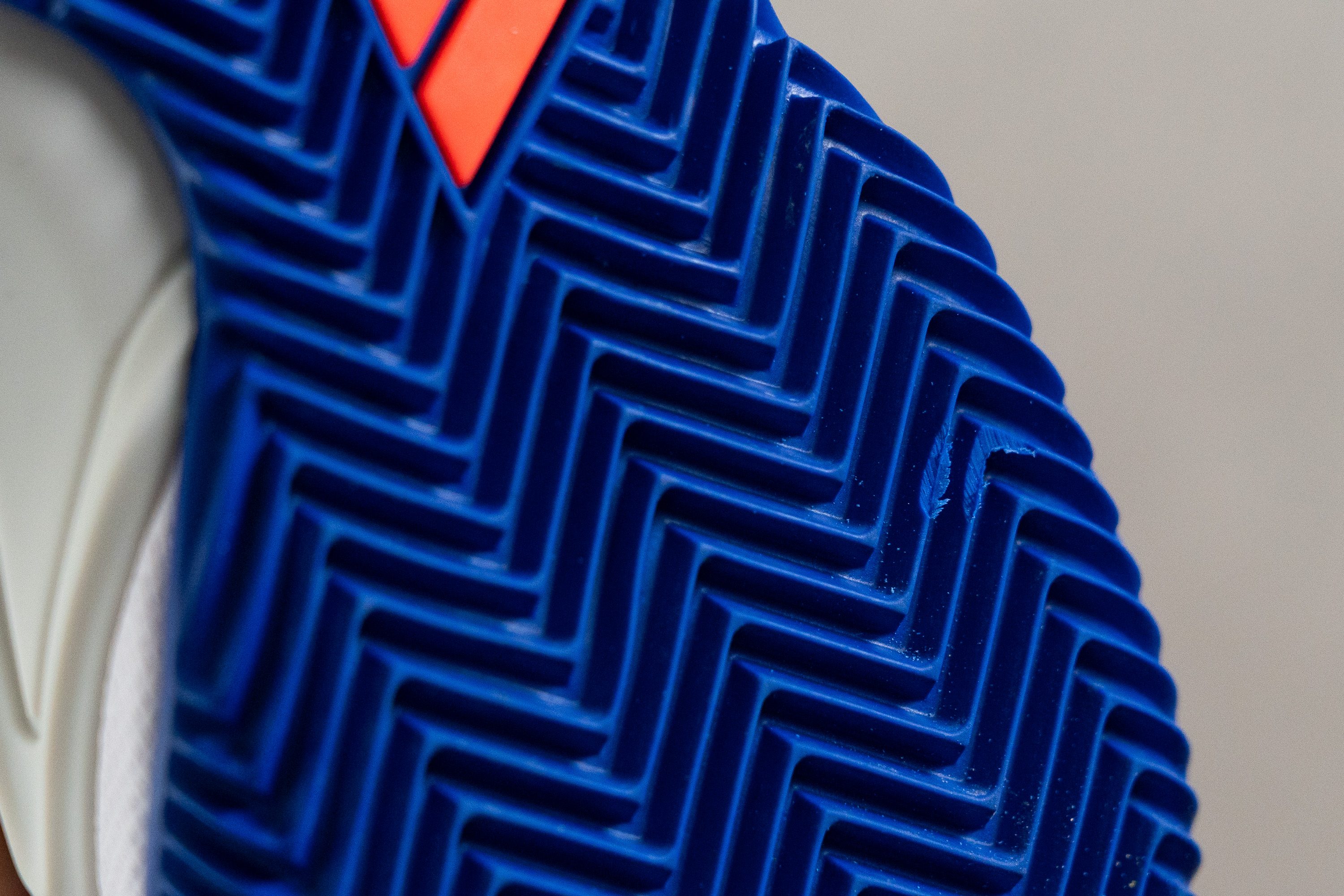
| Barricade Clay | 1.0 mm |
| Average | 0.7 mm |
Outsole thickness
It is also important that a tennis shoe has enough rubber to withstand the rigors of the sport. Based on our caliper, the outsole of this Adidas shoe is 4.4 mm thick. That's more than enough rubber for numerous hours of play.
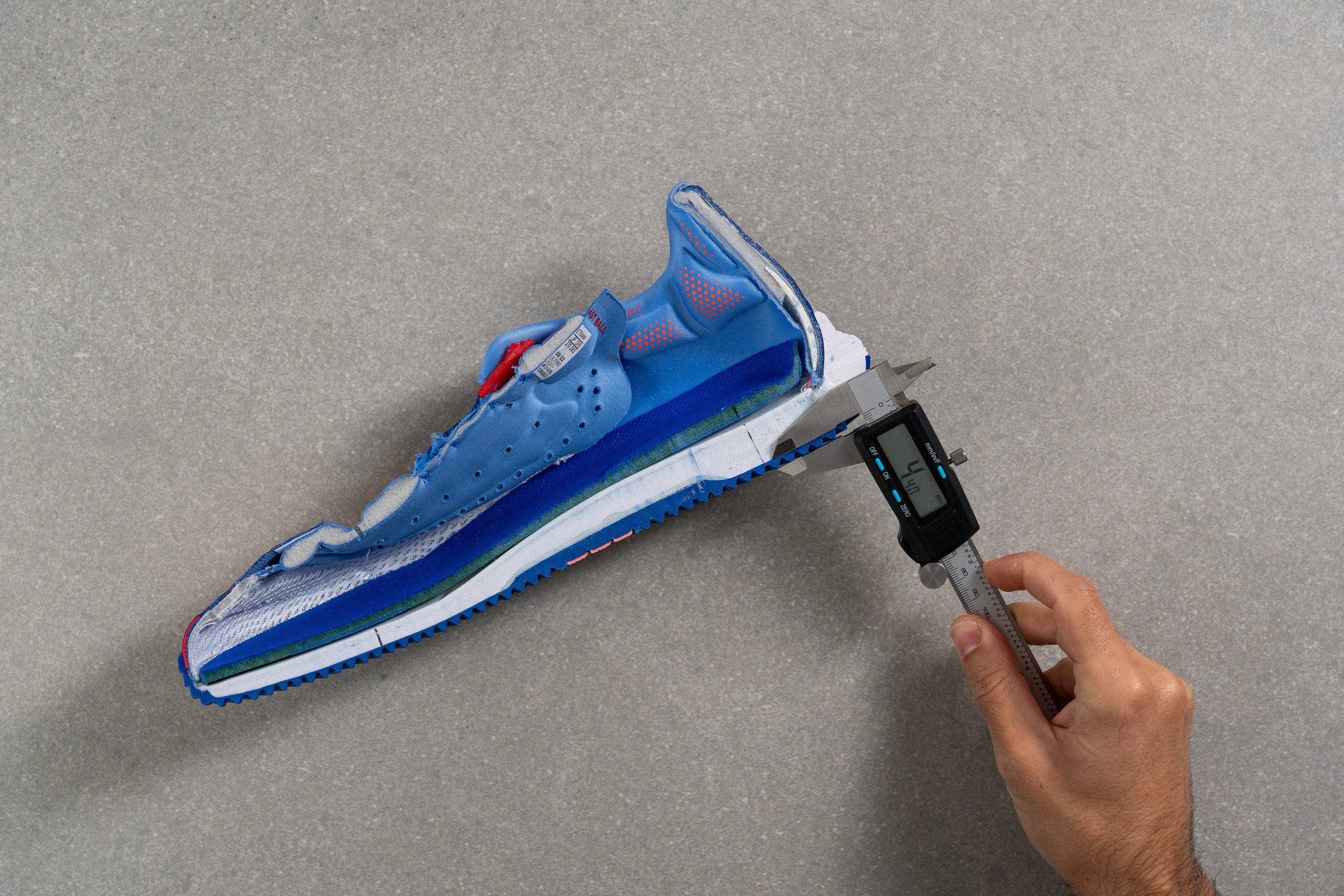
| Barricade Clay | 4.4 mm |
| Average | 4.2 mm |
Misc
Insole thickness
In-shoe comfort turns out to be of high priority in this Adidas tennis shoe. Based on our caliper measurement, its insole is 6.7 mm thick in the heel. That's a little more padded than the average.
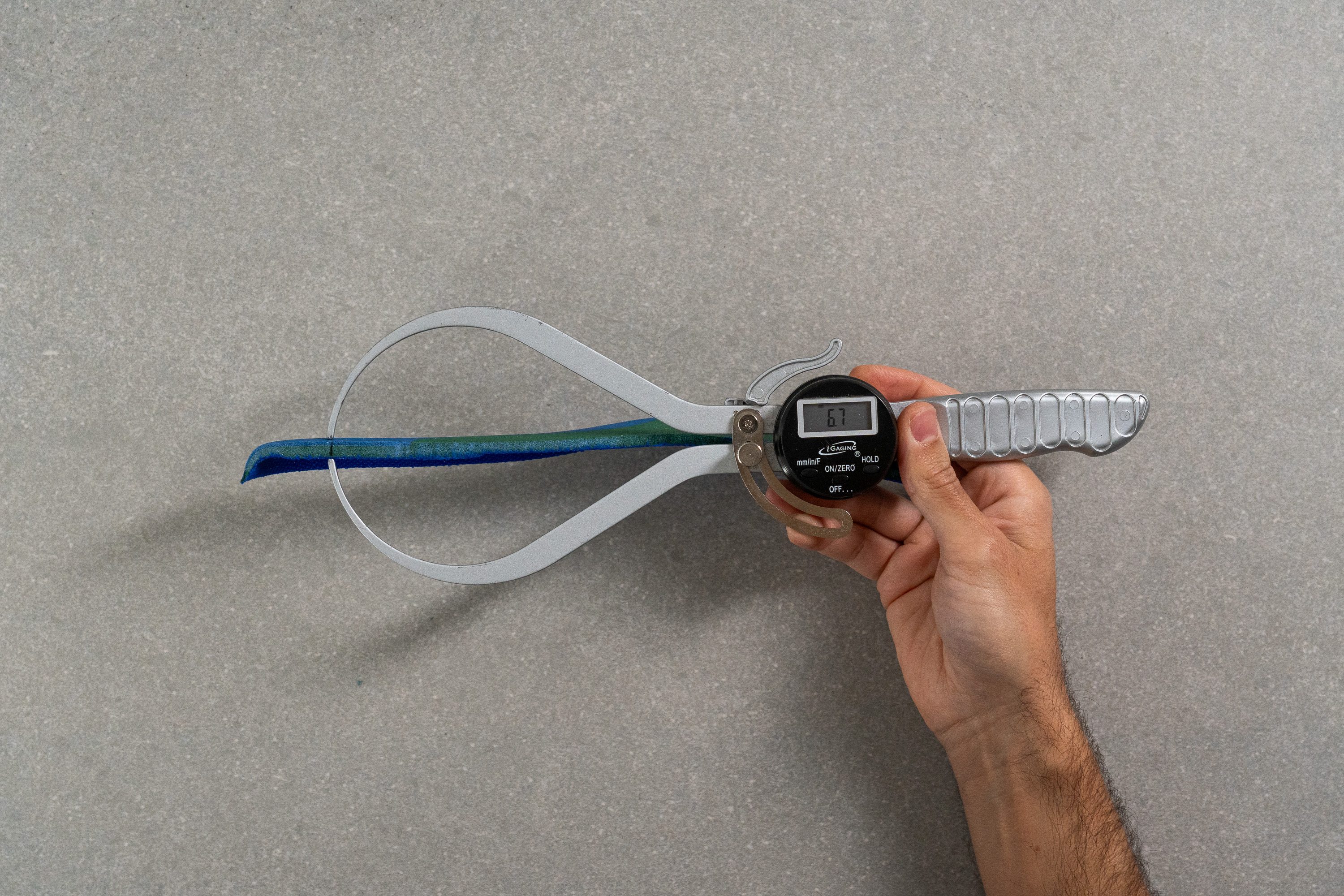
| Barricade Clay | 6.7 mm |
| Average | 5.1 mm |
Removable insole
If you even need to replace the shoe's stock insole with an aftermarket one, it won't be a problem at all.
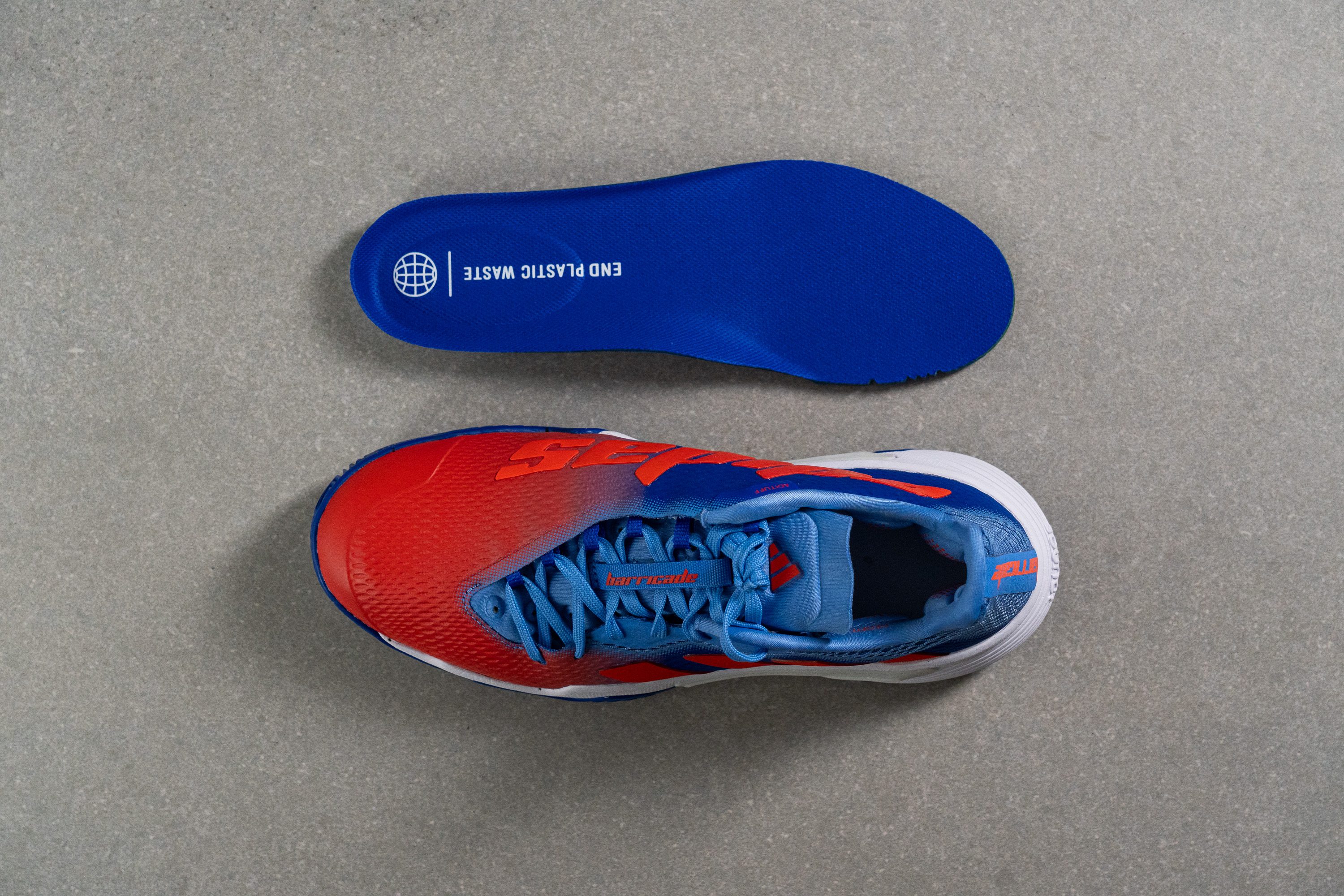
| Barricade Clay | Yes |
Tongue padding
In addition to the GeoFit pods in the ankle collar, the Barricade also added soft pillows to the shoe's tongue. Measuring their thickness with a caliper, we got 8.3 mm.
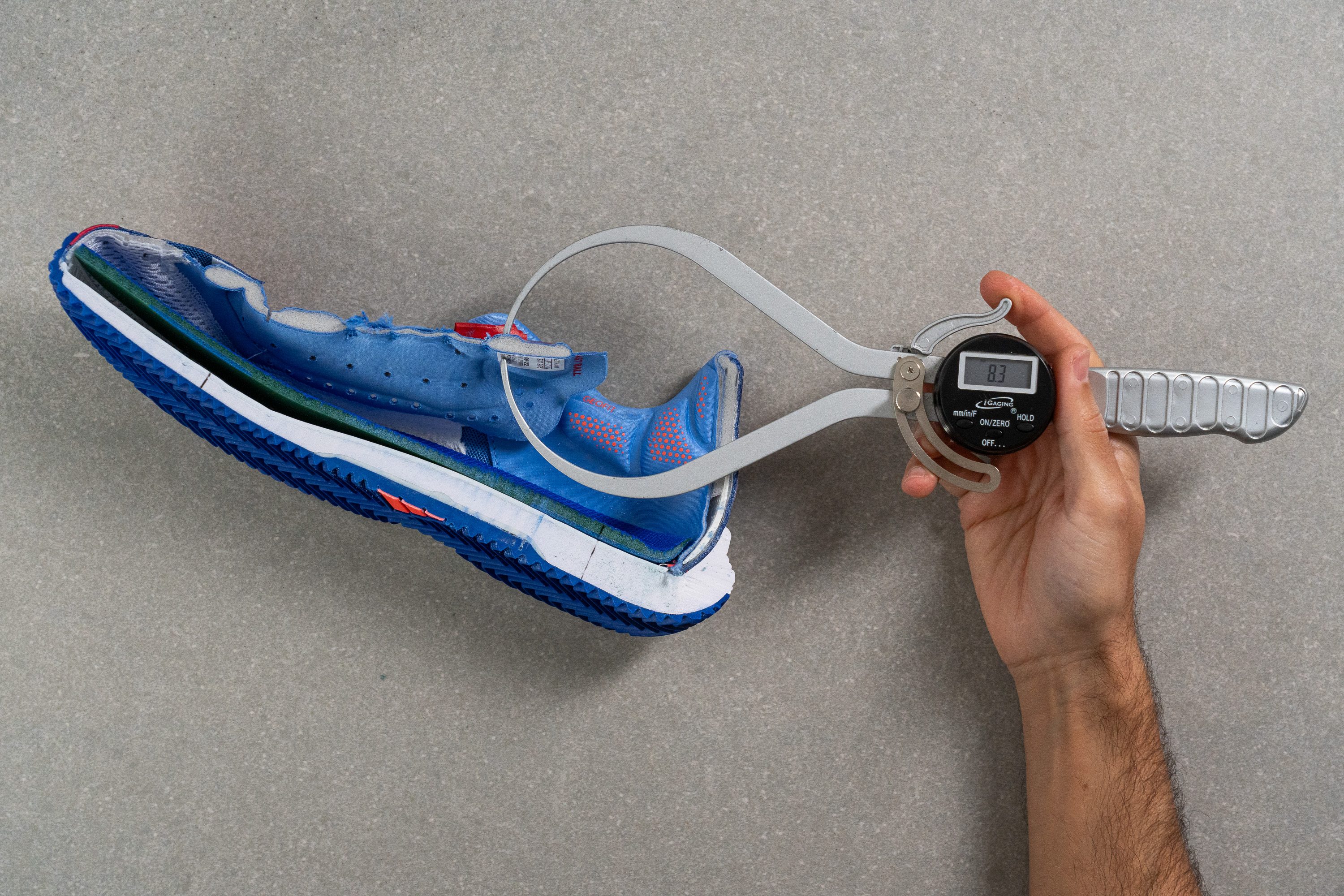
| Barricade Clay | 8.3 mm |
| Average | 8.2 mm |
Tongue: gusset type
The tongue of this Adidas shoe is fully integrated into the upper with some of the lace loops stretching down to the midsole. Once the shoe was all laced up, our foot felt like it was wrapped inside a burrito. And it remained that way throughout the playtest.
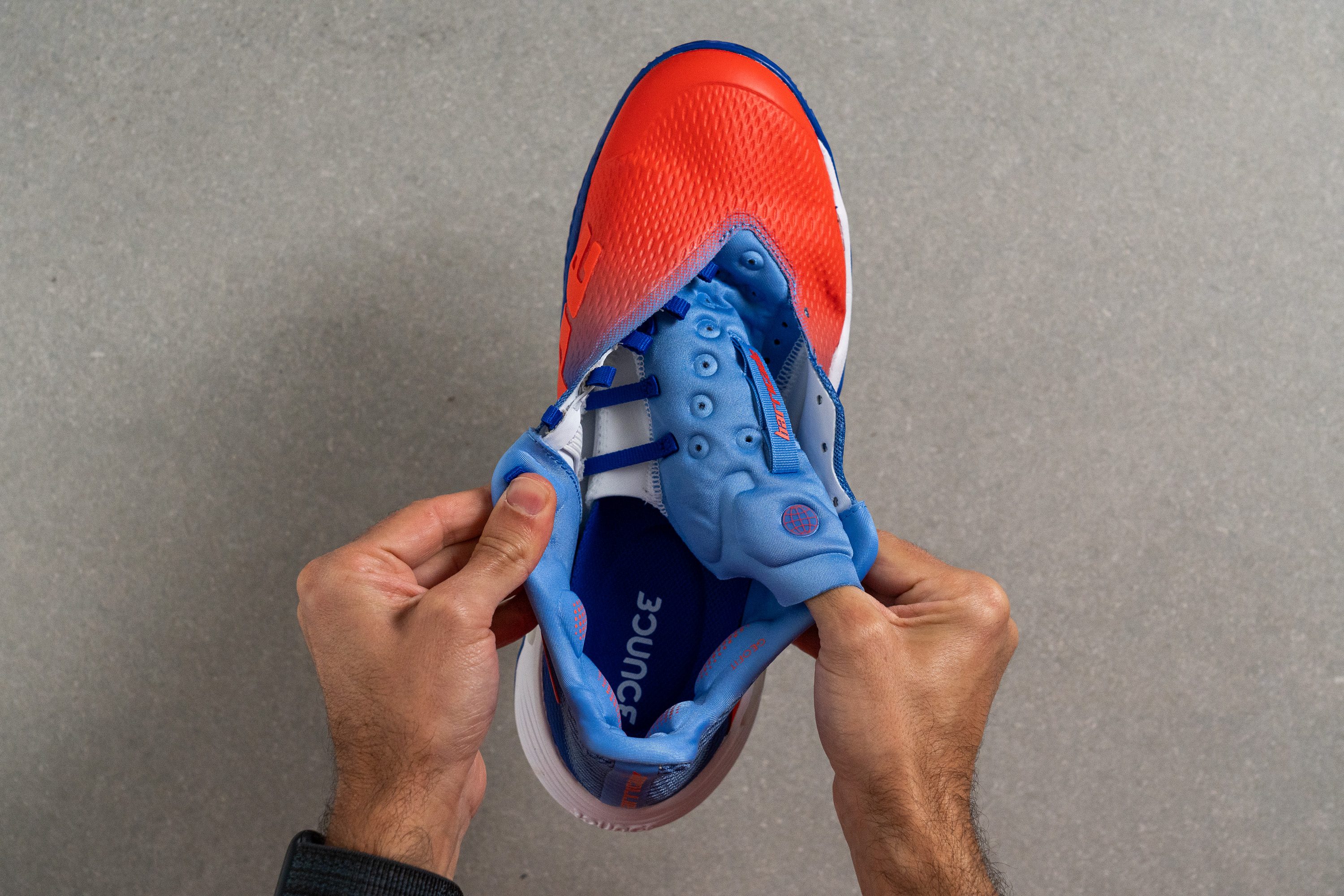
| Barricade Clay | Both sides (full) |
Heel tab
Adidas put so much thought into the Barricade Clay but it forgot one little detail - the pull tab. Given the shoe's fully gusseted tongue, it would be really nice to hold onto one when sliding inside.
The good news is that the Barricade 13 Clay comes with finger loops.
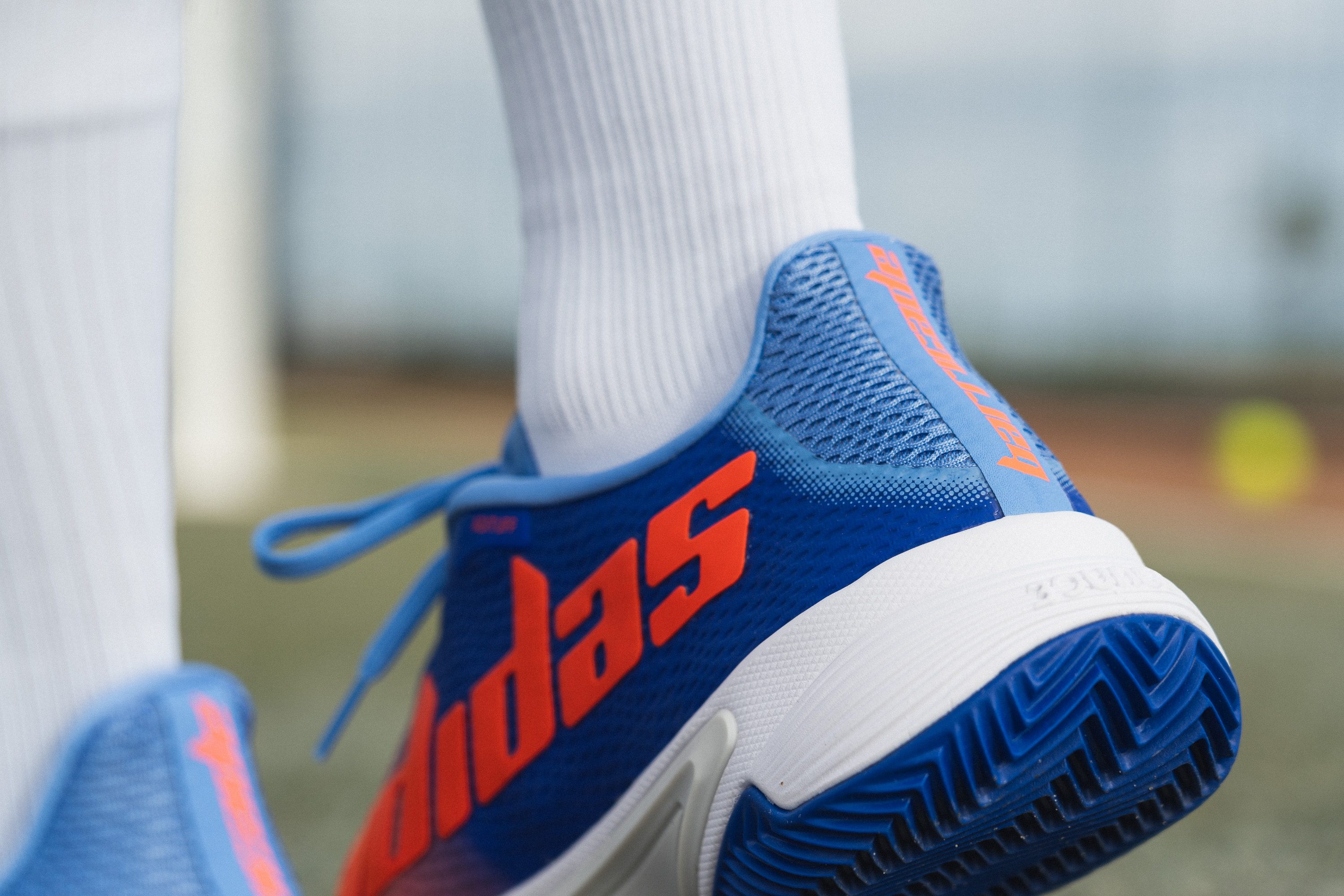
| Barricade Clay | None |

